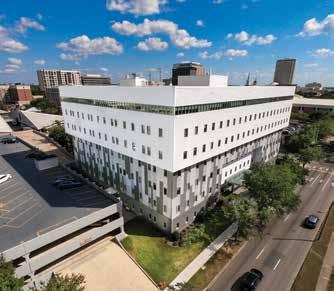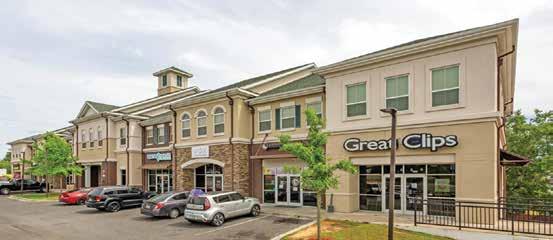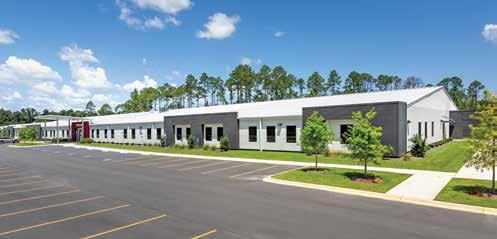HMO PIONEER REFLECTS ON HIS CAREER WILL GROWTH ALTER FREEPORT’S IDENTITY?


HMO PIONEER REFLECTS ON HIS CAREER WILL GROWTH ALTER FREEPORT’S IDENTITY?

Chris Trovas passes on retirement and chooses to build dream restaurant
FSU PRESIDENT EXCITED ABOUT SCHOOL’S PROGRESS ON BECOMING AN INSTITUTION DELIVERING REGIONAL IMPACTS

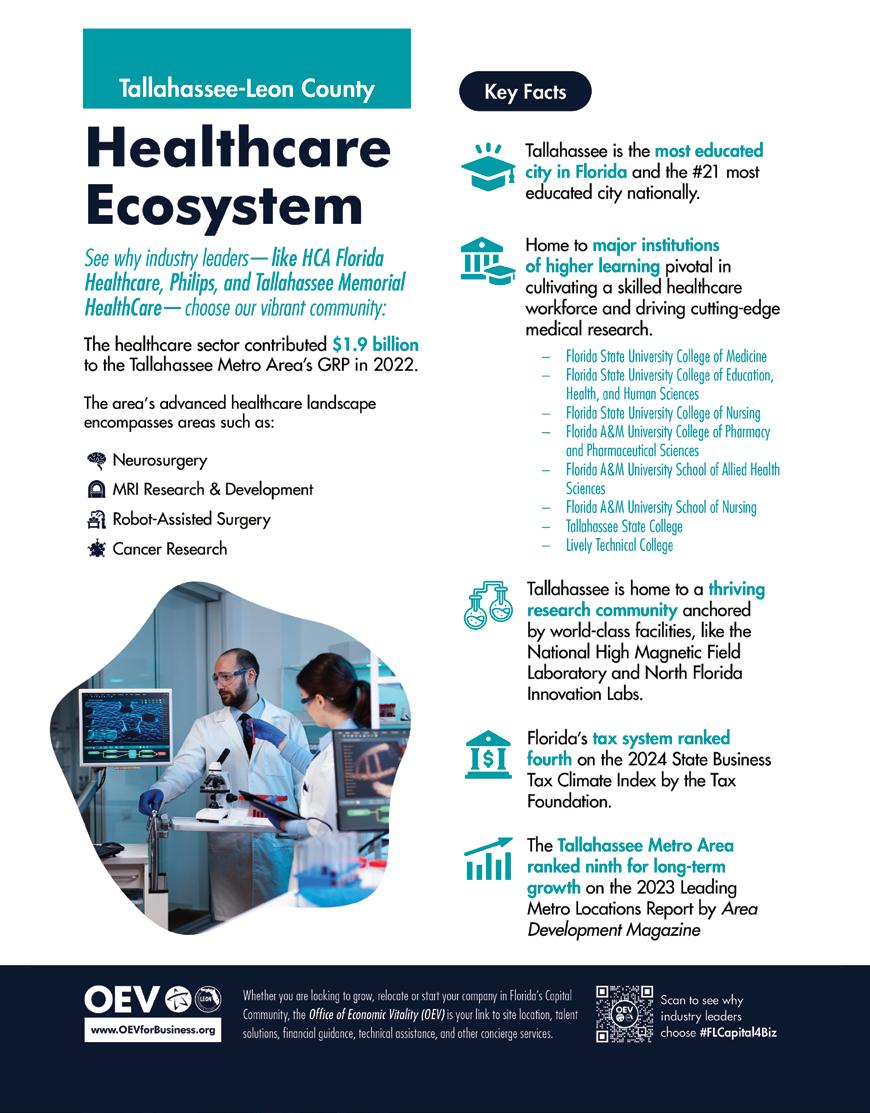





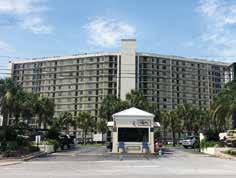

Structural restoration contractor specializing in exterior restoration of condominiums, municipal buildings, commercial properties and government facilities.

Phillip Gainer, a product of Washington County, is the secretary for the Florida Department of Transportation’s District 3, headquartered in Chipley, where Gainer resides. His route to work isn’t congested, but his job involves coordinating projects designed to keep pace with development. District 3’s efforts to compete for state transportation funding are complicated by the fact that while it is home to two of the 10 fastest-growing counties in the state — Walton and Santa Rosa — its population is the smallest among the state’s seven transportation districts. Even as development accelerates, the best the district can do is to apply a process for prioritizing projects and knock them off the list as funds become available. STORY BY
STEVE BORNHOFT
Since arriving in the big little city of Tallahassee in August 2021, FSU President Richard McCullough and his wife, Dr. Jai Vartikar, have become accustomed to a small-town vibe. “We’ve lived in a number of places — Pittsburgh, Cambridge (Massachusetts), Baltimore, New York, Dallas — and one of the things that sets Tallahassee apart is that the people are incredibly friendly and welcoming,” McCullough said. One of his priorities as president is strengthening relationships between FSU researchers and the private sector.
For 44 years, John Hogan served as the CEO of Capital Health Plan, one of the most successful and highly regarded HMOs in the country. After earning a master’s degree in health planning at the University of Virginia, Hogan worked for regional health systems agencies in Brunswick and then Albany, Georgia. The jobs aligned with his master’s degree but not with what he truly wanted to do. Versus planning and development, his greater interest was in bringing about market alternatives to the traditional fee-for-service approach to health care.
Chef
Chris Trovas beamed as he reflected on the private, Italian wine tasting dinner he had served the night before at his Wild Olives restaurant in South Walton. He values such occasions as opportunities
ON THE COVER: Chef Chris Trovas was tired and out of shape. He had enjoyed a successful run with his Wild Olives restaurant in Rosemary Beach and contemplated retirement, but there is something about the joys of cooking and interacting with satisfied diners that he couldn’t leave behind. So, Trovas whipped himself into the best condition he’s been in since his college days and developed the restaurant of his dreams on Scenic Highway 30A in Santa Rosa Beach. The Mediterranean-style fine-dining establishment is complemented by an adjoining wine shop. PHOTO BY DAVE
to push himself and truly shine. “We had big boards with picanha steak on them,” Trovas described the fare. “Brussels sprouts. Parsnip puree. We had pork osso bucco for the main course and paired it with a Barbaresco and a Barolo, side by side. The response was amazing when the diners discovered the difference between the two wines,” the chef said. “It was an eyeopening part of the dinner.”
Matt Algarin, the director at Walton County Tourism, favors a regional approach to tourism promotion. That sentiment is shared by Algarin’s counterpart in Okaloosa County, Jennifer Adams Kemp. “We would rather them stay in the region than go somewhere else, even though they may not get to me the first time,” she said. “They will get to me at a later date.” Individual counties have their respective attractions, but there is nothing to prevent visitors from parasailing off Panama City Beach one day and cooling off at Vortex Spring in Holmes County the next.
Mayor Russ Barley likes to make the rounds in Freeport, delivering progress reports to service clubs and other gatherings. He talks about efforts by the city to develop infrastructure in anticipation of growth rather than in response to it. He cites work to expand the city’s existing wastewater treatment facility and its plans to build a second one on the east side of town. He lists businesses that are new to Freeport: Circle K, Pizza Hut, Emerald Coast Title Co., 331 Noodles, Tool Expo, Otto’s Car Wash. He cites development orders — approved, pending and anticipated — and reports that the city can be expected to grow to 30,000 in population in the next 10 years.
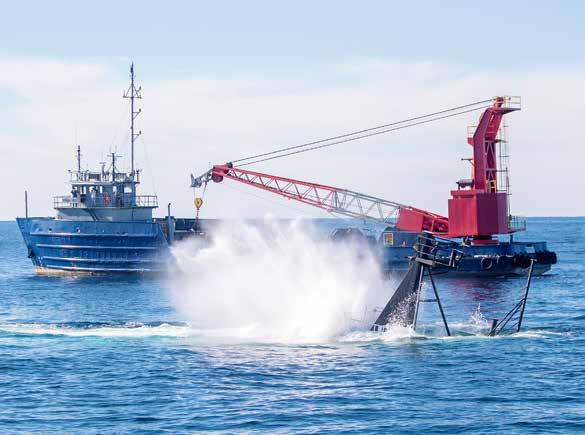

A group of friends united by a passion for fine wine and a philanthropic spirit decided in 2005 to host a silent auction to benefit children in need in Northwest Florida. To their delight, the event raised around $80,000 and laid the groundwork for what would become the Destiny Charity Wine Auction Foundation. As of last year, the organization had distributed $32 million in
donations to children’s charities in Escambia, Okaloosa, Walton and Santa Rosa counties and benefitted an estimated 100,000 youths.
In 2014, Eastman Chemical acquired the Taminco Corp., including its plant located in Pace in Santa Rosa County. Today, the facility employs over 100 workers and has about 50 resident
contractors. Its main products are various types of amines — derivative compounds of ammonia. These “functional amines” and their derivatives serve as key building blocks in a broad array of chemical products with a wide range of applications, including agriculture, manufacturing, water treatment, personal and home care, pharmaceuticals, animal nutrition, and oil and gas end markets, among others.
28 PINNACLE
RECAP Thirteen well-deserving women were honored at the 10th annual Pinnacle Awards luncheon. The day celebrated and congratulated the contributions of these leading ladies, who are making outstanding impacts on the Northwest Florida region.
30 COMMERCIAL
ESTATE Longtime business partners and Tallahassee realtors, J.R. Long and Stewart Proctor, have joined Ciminelli Real Estate Services to expand their impact and offerings throughout Northwest Florida.

The Pinnacle Awards spotlight leading women in business who hold themselves to high standards and contribute to the betterment of the community.
We look forward to unveiling the 2025 class of recipients in the winter issue of 850 Business Magazine.

PRESIDENT/PUBLISHER
BRIAN E. ROWLAND
ASSOCIATE PUBLISHER
MCKENZIE BURLEIGH
EDITORIAL
EXECUTIVE EDITOR, 850 BUSINESS MAGAZINE Steve Bornhoft
EDITOR, TALLAHASSEE MAGAZINE Sara Santora
EDITOR, EMERALD COAST MAGAZINE Paige Aigret
SENIOR CONTENT EDITOR Laci Swann
CONTRIBUTING WRITERS Hannah Burke, David Ekrut, Al Krulick, Rebecca Padgett Frett
CREATIVE
VICE PRESIDENT / PRODUCTION AND TECHNOLOGY Daniel Vitter
CREATIVE DIRECTOR Jennifer Ekrut
SENIOR ART DIRECTOR, TALLAHASSEE MAGAZINE Saige Roberts
ASSOCIATE ART DIRECTOR, EMERALD COAST MAGAZINE Sarah Burger
SENIOR PUBLICATION DESIGNER AND ART LEAD, 850 BUSINESS MAGAZINE Shruti Shah
SENIOR PUBLICATION DESIGNER Scott Schiller
GRAPHIC DESIGNER Sierra Thomas
CONTRIBUTING PHOTOGRAPHERS Dave Barfield, Mike Fender, Gwyne Gray Photography, Joe Kistel of Kistel Media, Shanna Mangunson, Shelly Swanger Photography, Kiara Watson, The Workmans
SALES, MARKETING & EVENTS
SALES MANAGER, WESTERN DIVISION Rhonda Lynn Murray
SALES MANAGER, EASTERN DIVISION Lori Magee Yeaton
DIRECTOR OF NEW BUSINESS DEVELOPMENT, EASTERN DIVISION Daniel Parisi
DIRECTOR OF NEW BUSINESS DEVELOPMENT, WESTERN DIVISION Dan Parker
ADVERTISING SERVICES MANAGER Tracy Mulligan
SENIOR ACCOUNT EXECUTIVE Julie Dorr
ACCOUNT EXECUTIVES Darla Harrison, Renee Johnson, Erica Wilson
MARKETING MANAGER Javis Ogden
SALES AND MARKETING WRITER Rebecca Padgett Frett
MARKETING FULFILLMENT COORDINATOR Katie Grenfell
OPERATIONS
CUSTOM PUBLISHING MANAGER Sara Goldfarb
CUSTOMER SERVICE REPRESENTATIVE/ AD SERVICE COORDINATOR Sarah Coven
PRODUCTION AND DISTRIBUTION SPECIALIST Melinda Lanigan
STAFF BOOKKEEPER Amber Ridgeway
DIGITAL SERVICES
DIGITAL EDITOR/MARKETING SPECIALIST Alix Black 850 BUSINESS MAGAZINE 850businessmagazine.com, facebook.com/ 850bizmag, twitter.com/850bizmag, linkedin.com/company/850-business-magazine
ROWLAND PUBLISHING rowlandpublishing.com
SUBSCRIPTIONS


A one-year (4 issues) subscription is $25. To purchase, call (850) 878-0554 or go online to 850businessmagazine.com. Single copies are $5.95 and may be purchased at Midtown Reader in Tallahassee and at Barnes & Noble and Books-A-Million in Tallahassee, Fort Walton Beach, Destin, Pensacola, Panama City and through our Tallahassee office.

Tallahassee Memorial HealthCare is home to the largest and most advanced surgical program in the Big Bend. As a Center of Excellence in Robotic Surgery, TMH uses robotic systems to increase precision and decrease incision sizes. Our robotic procedures mean shorter hospital stays, less pain, reduced recovery time and smaller scars for our patients. Meet our surgeons and learn more about the benefits of robotic surgery at TMH.ORG/Surgery.
I was privileged to meet FSU’s First Family
I have found that, many times, the best interviews are those that are arrived at the least easily. The most compelling subjects are often people who are habitually busy.
So, I kept at it for 18 months in which I would periodically contact Florida State University officials in an effort to arrange for a writer to sit down with FSU President Dr. Richard McCullough and his wife, Dr. Jai Vartikar. Finally, stars and calendars aligned, and an interview was scheduled for a December afternoon during a holiday break in classes.
Our story based on that conversation appears in this edition of 850 Magazine. I think you will find that President McCullough and First Lady Vartikar are the right people to steer the FSU ship as the school works to build upon its status as one of the top universities in the country and serve as an asset that will benefit all of Northwest Florida for decades to come.
President McCullough left Harvard University, where he served as vice provost for research, to come to Tallahassee. Dr. Jai, as she is known around campus, and her husband both hold doctorates in chemistry from Johns Hopkins University, where they met as graduate students. She has emerged at FSU as an enthusiastic “Ambassador for the Arts.” His interests include strengthening the relationship between FSU’s research arm and the private sector, thus improving the flow of new advancements and products to the marketplace.
I thought carefully about where best to photograph the FSU president and First Lady before settling upon the President’s House. I intended for our project to represent both their personal and professional sides. The decision would prove to be a good one, and the photo shoot would include an element that I hadn’t anticipated.
Photographer Dave Barfield and I arrived at the residence early to check out possible settings for a cover photo. We settled on the backyard versus the home’s formal interior in part because it would give Dave the opportunity to take advantage of natural lighting. While inside, I noticed a dog bowl in the kitchen. When President McCullough and Dr. Jai presented
themselves for the proceedings, I asked them whether we might include “Bodhi” in some shots. We opted to first take some photos without the dog and try later to add Bodhi — I was told he can be highly protective of his owners.

Bodhi, I should point out, is a Saint Berdoodle, not quite large enough to replace Renegade the Appaloosa in pregame festivities on Bobby Bowden Field, but he’s stout. When President McCullough brought him outside on a leash, Dave and I gave Bodhi plenty of room. I think you will agree that the cover shot worked out well, and I invite you to make some discoveries about FSU’s first couple by reading our story.
I would also like to congratulate Alice Collins, the “Queen of Forgotten Coast Real Estate,” upon completing 50 years in business. Alice had a vision decades ago, and hers was the first real estate company to set up an outpost on St. George Island at a time when it was accessible only by ferry. Over the years, she’s built a leading real estate vacation rental service company and has been an integral part of the island’s growth and plans for responsible development.
I have had the pleasure of knowing Alice for more than 20 years. Take it from me, her passion for the quality of life along our developing coastline is unparalleled.
Have a great summer!
Brian Rowland browland@rowlandpublishing.com



LATITUDE TOWN SQUARE – AMENITIES NOW OPEN!
• Paradise Pool with Beach Entry and Tiki Huts

Sunshine and cool breezes. Palm trees and margaritas. Welcome to Latitude Margaritaville, a 55-and-better community inspired by the legendary music and lifestyle of Jimmy Buffett, built on food, fun, music and escapism.
Escape to the place where fun and relaxation meet.
Escape to island-inspired living as you grow older, but not up.
Escape to Latitude Margaritaville Watersound, located on Hwy 79, less than 8 miles from the beach.
New homes from the $300s
| Sun. 11:00am - 5:00pm SALES CENTER AND 13 MODELS OPEN DAILY!
• Latitude Town Square with Live Music Bandshell
• Latitude Bar & Chill Restaurant with Panoramic Views of the Intracoastal Waterway
• Overlook Bar
• Fins Up! Fitness Center with Indoor Pool
• Tennis, Pickleball and Bocce Ball Courts
• Town Square Game Lawn
• Barkaritaville Dog Park
• Walking Trails and Multi-Use Sport Court





For the 10th year, Rowland Publishing, Inc. and 850 Business Magazine celebrated contributions made by outstanding Northwest Florida women at the 2024 Pinnacle Awards. The luncheon, held at the WaterColor LakeHouse, took place March 4.
For details about the 2024 honorees and event, including videos, photos and more, visit 850BusinessMagazine.com/women-leaders-honored.
Let’s get down to business. Get the latest business news around the 850 region, including business openings, people on the move and more by visiting 850BusinessMagazine.com/news

Held Feb. 16–18, 2024, the 22nd annual Seaside School Half Marathon & 5K race weekend raised an impressive $545,000 to support education initiatives at the Seaside School. The funds raised from the race weekend directly benefit the academic and operational programming of the two Seaside School campuses — the Seaside Neighborhood School and Seacoast Collegiate High School — in partnership with the Seaside School Foundation. Learn more at 850BusinessMagazine.com/ seaside-school-race-weekend-raises-545k

Our work lives can be very rewarding but also challenging, and it’s important to achieve a healthy work-life balance. There’s no better way to unplug, relax and unwind than by experiencing an amazing Ultimate Hilton Sandestin Beach Resort Getaway. Enter by June 9, 2024, to win the escape you’ve been longing for!
Enter for your chance to win at 850BusinessMagazine.com/ ultimate-hilton-sandestin beach-resort-getaway
Read the latest 850 Business Magazine “Bytes” — essential information about business openings, professional promotions, awards, honors and more — at your convenience online.
For the latest news and information, sign up for our free e-newsletter. 850BusinessMagazine.com/ newsletter-mailing-list
Find 850

The best kind of facial recognition is face-to-face.
A smiling face helps open your phone and, at Capital City Bank, it helps open lasting relationships. We’re proud of our online banking and app, yet face-to-face is how we get to know you personally and match your financial needs with the best banking solutions. ccbg.com.

CAPITAL // HAPPENINGS
Florida Gov. Ron DeSantis signed Senate Bill 522 into law, renaming Tallahassee Community College as Tallahassee State College , effective July 1, 2024. A group of TCC leaders were invited to attend the signing, including TCC president Jim Murdaugh, trustees Eugene Lamb, Jr., Frank Messersmith, Karen B. Moore, Monte Stevens, Charlie Ward, Jr., vice president and chief of staff Candice Grause, and student body president Jullion Griffin . They were joined by SB 522 sponsor Sen. Corey Simon and Sue Dick , president and CEO of the Tallahassee Chamber of Commerce
Florida State University has named acclaimed researcher and industry leader Kathleen Amm as the new director of the National High Magnetic Field Laboratory (National MagLab), the largest and highest-powered magnet laboratory in the world and the only facility of its kind in the United States. Amm, who served as director of the Magnet Division at Brookhaven National
Laboratory (BNL), began her tenure as lab director on May 6. She earned her doctorate from FSU in 1998 and was advised by the National MagLab’s founding director, Jack Crow, during the early days of the formation of the lab’s headquarters at FSU. As National MagLab director, she will be responsible for operations at FSU and the lab’s satellite locations at the University of Florida and Los Alamos National Laboratory. She will oversee more than 500 scientists/employees and welcome
added sidewalks and crosswalks along North Gadsden Street, leading to improvements in safety and connectivity. Ben Boulevard Drainage Improvements Phase 2 won in the category of Stormwater. The project improved the drainage system and added roadway conveyance to successfully allow stormwater to flow into a drainage basin. Visitor Information Center–Amtrak Station won in the category of Historical Reservation/ Preservation. The project restored and transformed Tallahassee’s historic Amtrak train station, turning the building into a multifunctional space including a visitor information center and gift shop, the Visit Tallahassee office and a community room.


Capital City Bank recognized 31 of its best and brightest sales and service leaders at its annual Star Summit event. Tallahassee network support tech Tijuana Eberhardt and client experience manager Scott Gerber received additional recognition as the recipients of the distinguished Ripple Effect and Mountain Mover awards. The Ripple Effect and Mountain Mover are two of four top honors conferred at Star Summit.
more than 2,000 visitors each year.
Leon County Government received three Project of the Year awards from the Big Bend Branch of the American Public Works Association (APWA). Each year, APWA spotlights exceptional projects that meet project goals within budget and exceed public expectations. The North Gadsden Street Sidewalk Improvement project won an award in the category of Best Performance. This project enhanced and

announced the addition of Travis Yelverton, vice president and corporate relationship manager, to its Tallahassee team. Yelverton is a lifelong resident of Tallahassee who earned a finance degree from Florida State University. He brings to SmartBank an extensive background in commercial banking, finance and economic development.
In 2022, Electronic Arts launched The John Madden Legacy Commitment to Education , a reflection of Madden’s passion for education and creating opportunities for young people in underrepresented communities. The Commitment includes the EA Madden Scholarship Program, which is open to undergraduate students at historically Black colleges and universities and offers financial support, mentoring and career readiness support. In 2024, of 24 scholarship recipients, three were Florida A&M University students: Jimelle Brewster, Benjamin Lawson and Howard Smith
AtWork , a leading staffing franchise for empowering job seekers and facilitating company growth, has opened its newest location in Tallahassee. AtWork Tallahassee is owned by Elevate Business Solutions, Inc. , a local group committed to helping the area’s economy thrive by connecting qualified job seekers with rewarding opportunities. AtWork puts nearly 40,000 individuals to work each year in administrative, light-industrial, accounting and finance, hospitality, IT and management positions. The Tallahassee location will help local schools with staffing and recruitment needs and focus on college students seeking work.
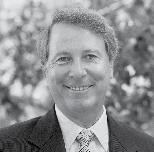
Bring Me A Book Forgotten Coast (BMABFC) recently received a generous donation
from Rick Kearney and The Beatitude Foundation . The money received will enable the expansion of services in Gulf County, including the distribution of more than 6,000 books at BMABFC's Book Bonanza, an annual event that encourages summer reading. BMABFC is a literacy initiative in Franklin and Gulf counties that inspires children ages 0-12 to read through a variety of programs such as reading aloud to children enrolled in Head Start, public schools and nursery school classes, as well as the annual Book Bonanza.
APTIM , an environmental and resilience firm focused on developing the next generation of environmental and sustainability scientists, professionals and thought leaders, has partnered with Florida A&M University The FAMU School of the Environment’s Sustainability Institute provides experiences that inspire students to advance sustainable solutions to food
security. APTIM has donated money to support the institute’s EnergyWaterFood ClimateNexus. Initiatives include Nexus Scholars-inResidence, which provides 20 undergraduates with scholarships and mentorship, and the Nexus Global Summit, a space for international thought leaders to solve complex environmental challenges.
Santa Rosa Golf & Beach Club received multiple honors at the 2024 Perfect in Walton County Awards. The Gulf-front club earned the prestigious Diamond Winner award for Best Golf Course and won double Platinum Winner awards for Best Wedding Venue and Best Fine Dining for its on-site restaurant, Vue on 30a Saltmarsh, Cleaveland & Gund of Pensacola, a recent recipient of ClearlyRated’s Best
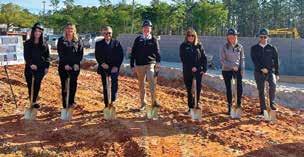

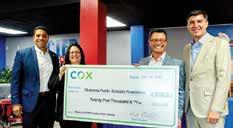
Cox Communications donated more than $2 million in cash and in-kind donations to charities and nonprofits along the Gulf Coast, boosting their fundraising endeavors. The company primarily provides support to organizations dedicated to youth, education, diversity, technology and conservation initiatives. In addition to sponsorship of nonprofit fundraising events, Cox also made three grant donations to local organizations. A gift from the James M. Cox Foundation for $500,000 to the Baptist Health Care Foundation will be used to implement a state-of-the-art patient monitoring system at their new hospital in Pensacola. Additionally, the Boys & Girls Clubs of the Emerald Coast received a $20,000 grant from Cox Communications for technology updates at the Fort Walton Beach Club . The Okaloosa STEMM Academy received a $25,000 grant from Cox Communications for the purchase of equipment for the school.
Community leaders, members of the Walton Area Chamber of Commerce and Costa employees gathered to celebrate the groundbreaking for the first McDonald’s location in Santa Rosa Beach. It will be built by Stansell Properties & Development and result in the creation of 60 jobs. It is the first of two Santa Rosa Beach locations Costa plans to open in 2024.
of Accounting Award for providing superior service to clients, has been included in Accounting Today’s list of Regional Leaders. This is the eighth year the firm has been recognized as a Regional Leader in the Gulf Coast for achieving year-to-year growth. Founded in 1944, the firm offers a full range of professional services, including specialized consulting services for many industries and high-networth individuals.
Beck Partners , one of Northwest Florida’s leading commercial real estate firms, has announced its acquisition by Stirling . Stirling is headquartered in Covington, Louisiana, and has additional offices in Baton Rouge, New Orleans, Lafayette, Shreveport, Hammond, Mobile, Alabama and Pensacola. Stirling’s

acquisition of Beck Partners expands its Pensacola office, adds a Tallahassee office and adds 30 employees. It also brings additional licensure not previously held by Beck Partners in Arkansas, Georgia and Texas. Its diverse service lines will expand Beck Partners’ presence throughout the Gulf South and beyond with its commercial brokerage, asset and property management services, development and redevelopment activity, and acquisitions and investments.
Santa Rosa Golf & Beach Club announced the appointment of Mark Hodgdon as its new general manager. Hodgdon has held significant roles at other prominent establishments including the Hilton Atlanta Airport, Los Cabos Collection, Sandestin Golf and Beach Resort, The Grand
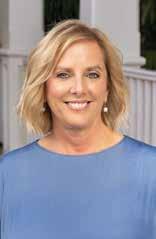

of Florida has been recognized with the Berkshire Elite Circle Award, a designation given to the Top 50 companies in the Berkshire Hathaway HomeServices global network. The company, which ranked No. 26, was honored during a ceremony held at the Berkshire Hathaway HomeServices annual sales convention in New Orleans.
In addition, the brokerage’s 30A headquarters was recognized as the No. 7 office within the global network for gross commission income. Sales executive Anne Winicki was honored as the No. 7 individual agent for gross commission income, earning the prestigious Top 25 Individual Sales Agent Award. In addition, Winicki was honored with a Chairman’s Circle Diamond Award for her excellent sales performance in 2023, placing her in the top ½ of 1 percent among nearly 55,000 Berkshire Hathaway HomeServices network agents.

announced its top performers for 2023. Its Real Estate Sales Division recognized Shannyn Stevenson with the Top Sales and Top Listing Agent awards. Other 2023 Top Producers include Heather Sprigler, the second highest-performing agent for listings and sales; Diane Green, the third-highest performer for sales; and Colin Kirkwood, the third-highest volume of listings within Newman-Dailey’s real estate division.
EMERALD COAST // HAPPENINGS
Partners HCA Florida Fort Walton-Destin Hospital and the Okaloosa County School District (OCSD) announced the opening of the Health Academy of Northwest Florida on the hospital’s campus. The Health Academy of Northwest Florida is the first high school health academy to be housed on an HCA Healthcare hospital campus anywhere in the country. It provides high school students interested in health care careers with the opportunity to earn industry certifications and either directly enter the workforce or continue their studies following high school graduation. As part of the partnership, HCA Florida Fort Walton-Destin Hospital provided a 6,375-square-foot space to OCSD for the academy, including two classrooms and two labs. Students who successfully complete the practical nursing program will have job placement opportunities throughout HCA Florida Healthcare. In addition, if employed by an HCA Florida Healthcare facility, tuition reimbursement will be available for students wishing to continue their education.
America Hotel in Salt Lake City, Starwood Hotels & Resorts at The Phoenician, and The Ritz-Carlton and Huntington Hotel & Spa. With a career spanning more than four decades, Hodgdon has a track record of fostering positive team dynamics and enhancing guest and member satisfaction.
Pensacola International Airport (PNS) has welcomed Breeze Airways , offering nonstop flights to Tampa and one-stop/ no-change plane service to Norfolk, Virginia. The two destinations will have twice-weekly service on Mondays and
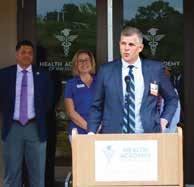
Fridays starting June 28. Breeze Airways is the eighth airline to offer flights at PNS.
CO:LAB , a business incubator set up by FloridaWest to encourage entrepreneurship in the greater Pensacola area, has welcomed Wellin5 owner William Masih . Launched first in Canada in 2019 and expanded to the U.S. in 2020, Wellin5 is a virtual therapy app that provides post-therapy support and significantly improves therapist-client relationships. Starting with mental wellness, Wellin5 aims to provide a wide range of services to boost the overall sense of health and well-being
over the course of the next few years as part of its long-term vision.
PenAir Credit Union announced the appointment of Andrew Reynolds as chief strategy officer. Prior to joining PenAir, Reynolds served as the chief growth officer at Blue Eagle Credit Union in Virginia where he played a pivotal role in driving strategic initiatives and fostering growth. He served as chief financial officer at Valley Star Credit Union, also in Virginia. Reynolds will be called upon to play a crucial role in PenAir’s continued success and growth.
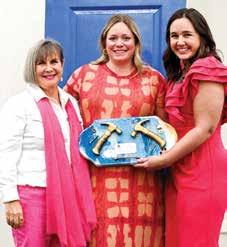

EMERALD COAST // HAPPENINGS
County has announced that the sixth annual Hard Hats & High Heels luncheon held at the Hilton Sandestin Beach Golf Resort & Spa raised more than$16,000. The funds raised will support the Women Build Initiative, which empowers women through education and training and enables them to comfortably use power tools and work at construction sites. The money will also be used to help build homes for deserving families in Walton County. During the luncheon, Habitat for Humanity presented its Power Women Awards, recognizing women in the community who have shared their time and talents to benefit the organization and its work. The 2024 Power Woman of the Year is Karah Young, president of the Destin Charity Wine Auction Foundation. DCWAF has provided more than $1.9 million to Walton County Habitat for Humanity over the last 12 years. The 2024 Glamour to the Hammer award went to Kim Crotwell for her dedication and volunteerism over the years.

INSPIRATION + PERSPIRATION + MANIFESTATION
FSU is becoming a transformative regional presence


Florida State University President Richard McCullough had arrived in DeFuniak Springs with time to spare and set about looking for coffee.
He wandered into the historic Hotel DeFuniak but left after not seeing anyone right away. He got the attention of a man in a pickup truck.
“Know anywhere I can get a cup of coffee?”
The man advised the stranger that if he were to walk to the back of the hotel, there was a pot brewing there.
“How about a coffee shop? I’d like to sit down someplace.”
The man suggested that the stranger try the Perla Baking Company, located across Baldwin Avenue from the curiously round Lake DeFuniak. Perla is short for “perfect lake.”
“It was a really cool coffee shop,” McCullough would recall a month later. “Nice people.”
The coffee was good and his day was off to a pleasant start, but McCullough had not departed Tallahassee last November intending to rediscover mainstreet America. (DeFuniak Springs’ population is 14% of FSU’s student population.) Rather, he was among 15 representatives of FSU who were about to attend one of the most pivotal and progressive meetings in the school’s 173-year history.
McCullough proceeded to the Walton County Commission chambers, where Triumph Gulf Coast board chairman David Bear gaveled the gathering to order.
Since arriving in the big little city of Tallahassee in August 2021, McCullough and his wife, Dr. Jai Vartikar, had become accustomed to a small-town vibe.
“We’ve lived in a number of places — Pittsburgh, Cambridge (Massachusetts), Baltimore, New York, Dallas, and one of the things that sets Tallahassee apart is that the people are incredibly friendly

and welcoming,” McCullough said. “I’m not sure that I’ve ever lived in a place where the people are as nice, engaging and genuine.”
Vartikar, known affectionately as Dr. Jai (pronounced Jay), agreed and added, “The family atmosphere at Florida State is genuine. It’s more than just collegial. People have your back, and we have felt like members of a very large family from Day 1. We had never felt that before, and we’ve been to some wonderful places.”
Members of the FSU family, McCullough said, have a remarkably strong attachment to the school.
“People love FSU like no other university we have been associated with,” he said. “That’s infectious, and it goes beyond athletics. When you talk to trustees and alumni, their dedication and fondness for FSU is like nothing I’ve ever seen.”
McCullough recognizes that he landed at FSU at a great time.
“The foundation for student success had been built,” he said. “A lot of work had gone into taking FSU from the 44thranked university in the country to 18th. And we’ve continued to improve in every category of student success since I arrived. Our retention rate is at a
People love FSU like no other university we have been associated with. That’s infectious, and it goes beyond athletics. When you talk to trustees and alumni, their dedication and fondness for FSU is like nothing I’ve ever seen.”
record 96%. Our six-year graduation rate is 85%. Our four-year graduation rate is 75%.
“And even as we are improving in those areas, we are focused on building our research funding in ways that will benefit all of Northwest Florida.”
From Pensacola to Tallahassee. From DeFuniak Springs to Wakulla Springs.
One agenda item on the Triumph board’s Walton County meeting agenda had everything to do with that regional ambition. The board was set to act on an application from FSU seeking $100 million for an Institute for Strategic Partnerships, Innovation, Research and Education (InSPIRE) to be located in Bay County.
FSU dadgum near got what it asked for.
The board supported the proposal with the largest grant award in its history, $98.4 million. InSPIRE will focus on aerospace, advanced materials for aerospace and hypersonic research, areas of concentration that McCullough finds highly consistent with assets and expertise already present in the region.
“The support of Chairman Bear and the board was phenomenal,” McCullough said. “We will build a couple of large facilities near the (Northwest Florida Beaches) airport and hire faculty who will live in the area. We will be involved in everything from basic research to classified research. We expect the workforce development, which is an important aspect of InSPIRE, will attract the attention of major employers.
“Northwest Florida is our backyard, and we are very excited about the project.”
→ Clockwise from top: Dr. Richard McCullough and his wife, Dr. Jai Vartikar, gather with family on the occasion of his inauguration as FSU president; President McCullough and First Lady Vartikar meet with James Frazier, dean of the FSU College of Fine Arts; the president and first lady on game day; McCullough and Vartikar are surrounded by Marching Chiefs; Vartikar sits in at a sound board at the FSU Film School; the couple visits the FSU Florence Study Center in Italy.
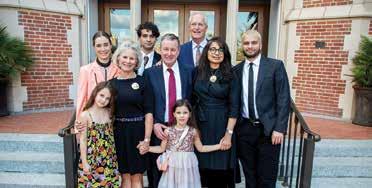





So, too, is Randy Hanna, the dean of Florida State’s Panama City campus, which hosted a February meeting where the term sheet for the InSPIRE grant was approved by the Triumph board.
“InSPIRE will be transformational and have generational impacts,” Hanna told that meeting. “At FSU PC, we look forward to partnering with the project.”
The man in the truck didn’t recognize McCullough the day that he and his team came visiting, but the region will experience their influence soon enough.
In Tallahassee and beyond, McCullough said, FSU’s Vice President for Research Stacey Patterson and its Associate Vice President for Strategic Partnerships and Innovation Valerie McDevitt are building an innovation ecosystem.
“Their efforts,” he said, “will help us increase the number of startup companies and licenses and patents that we are generating at the university.”
McCullough is an entrepreneur himself, having started two companies in Pittsburgh, one that produced materials for OLED televisions and another that is in business today and specializes in inks for printable electronics.
When McCullough starts to rattle off initiatives underway at FSU, it seems that he may not stop: expanded biomedical and life science research capabilities; quantum science and engineering initiatives; new discoveries in physics that promise to transform data storage; new magnetic materials; and government/civic initiatives. The list goes on.
Potentially the biggest of these initiatives centers on the Florida Panhandle. McCullough aims to address the region’s
↗ Clockwise from top: FSU First Lady Jai Vartikar meets with Center for Academic Retention and Enhancement program students; FSU President Richard McCullough and Vartikar inspect student projects during FSU Discovery Days; McCullough and Vartikar congratulate FSU’s NCAA championship winning women's soccer team from 2022; Vartikar familiarizes herself with the FSU Music Therapy Program in a meeting with director Valerie Williams and coordinator Ciele Gutierrez.
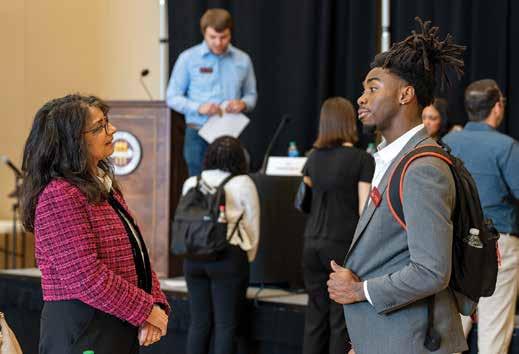

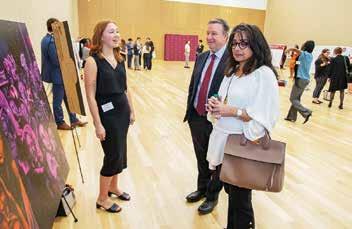

A college education is so important to social mobility. I am not a firstgeneration student, but my husband is.”
—
most pressing health needs and challenges by launching a new health care ecosystem stretching from Tallahassee to Pensacola. FSU Health will serve millions by leveraging the expertise and resources of Florida State’s programs in medicine, nursing, social work and public health, as well as its many research centers and community partners.
The first two new FSU Health facilities are under construction. Thanks to a $125 million appropriation from the Florida Legislature, a state-ofthe-art research and medical facility being built at Tallahassee Memorial HealthCare (TMH) in Tallahassee will attract world-class physician-scientists doing “bench to bedside” research to discover new diagnostics and therapeutics for clinical use. To the west, Florida State and TMH are partnering with The St. Joe Company to build a new FSU Health TMH medical campus in Panama City Beach.
“It’s a great time to be at FSU,” McCullough said in summary. “There is so much opportunity here.”
Prior to becoming an FSU Seminole, McCullough had served as vice provost for research and a professor of materials science and engineering at Harvard University for nine years. He led the Office of Foundation and Corporate Engagement and assisted in the oversight of more than 25 interdisciplinary institutes, centers and initiatives.
He developed the Harvard Data Science Initiative, a collaboration among 12 of the university’s schools and more than 120 faculty, which led to the creation of three master’s programs and many undergraduate courses.
Previously, McCullough spent 22 years at Carnegie Mellon University in Pittsburgh as a professor of chemistry, department head, dean of the Mellon College of Science and finally, vice president for research.
McCullough grew up in Mesquite, Texas, and attended Eastfield Community College before earning a bachelor’s degree in chemistry from the University of Texas at Dallas in 1982 and a doctorate in organic chemistry from Johns Hopkins University in 1988. He spent two years as a postdoctoral fellow at Columbia University in New York.
Vartikar, too, earned a doctorate in chemistry from Johns Hopkins, where she met her husband when both were graduate students there.
Born in India, she moved to Pennsylvania as a child and graduated as valedictorian of her class at Waynesburg Central High School. She received a bachelor’s degree in chemistry from the University of Pennsylvania.
Prior to coming to FSU, Vartikar served as the associate director of the Harvard Medical School Initiative for RNA Medicine. During her tenure, the number of faculty members involved in the project nearly doubled.
Vartikar and McCullough enjoy spending time with their son Jason; daughter-in-law, Sarah Christian; son Dylan; and two granddaughters, Gladys and Archer.
As FSU’s First Lady, Dr. Jai has emerged as an ambassador for the arts and is jazzed about a legislative appropriation that will pay for planning for an arts district, a concept that has been talked about, she said, for about 15 years.
“I meet a lot of people who are interested in the arts but don’t know everything that is going on here,” Vartikar said. “At FSU, we need to identify ways to better let the world know how great we are. I’m doing that with the arts, specifically.”
She has met with arts faculty and students and familiarized herself with programs and facilities. She has found that the arts intersect with many aspects of the university.
“We have a music therapy program that is one of the top programs in the nation,” Vartikar said. “We have an art therapy program. Our film school rivals the big names like NYU and USC — New York City and Hollywood, basically — in placing our students in the motion picture industry.”
Vartikar also has grown close to FSU’s Center for Academic Retention and Enhancement (CARE), which focuses on first-generation students.
“One of the first things I did in my role was to visit the CARE program,” she said. “I had a roundtable discussion with several of the students and left incredibly impressed and proud. I fell in love with everyone and everything there. We’re the leader in programs like it. I have heard students say that there is nowhere else they could have gone and been as successful.”
FSU was recognized with the nation’s top student success award from the Association of Public and Land-Grant Universities.
“A college education is so important to social mobility,” Vartikar said. “I am not a first-generation student, but my husband is.”
CARE supplies its students with coaches who help them navigate classes, the campus environment and practical matters like personal finances. Some CARE students are homeless. Nonetheless, CARE students graduate at the same high rate as FSU’s general population, McCullough pointed out.
“At FSU, it doesn’t matter where you come from,” Vartikar said. “What matters is that you’re here.” ▪
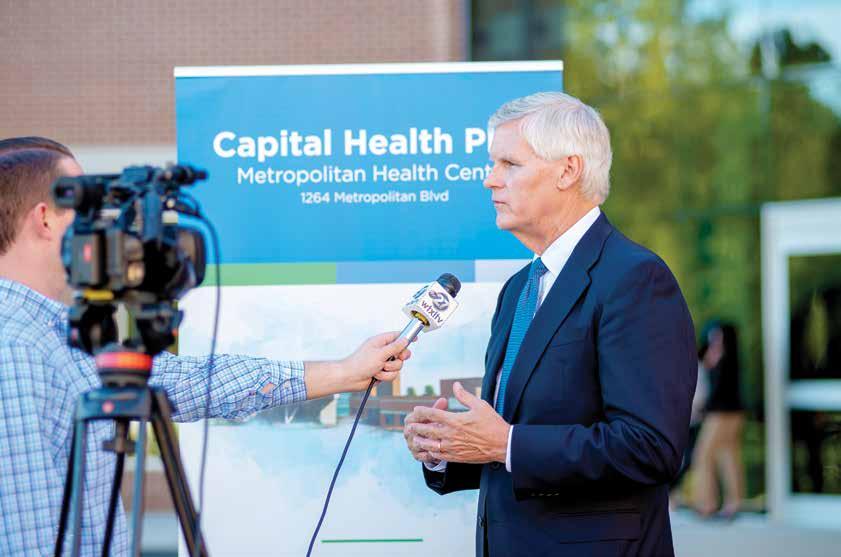
story by STEVE BORNHOFT
During an interview conducted at his home six months into his retirement, it became clear that John Hogan remains closely attuned to health care trends, market dynamics and the workings of state government.
Those areas commanded his attention throughout his 44 years as the CEO at Capital Health Plan (CHP), a primary care-focused, not-for-profit health maintenance organization (HMO) headquartered in Tallahassee, and for years prior to his arrival in Florida.
Hogan was looking forward to a speaking engagement at the Westminster Oaks retirement community, where he would discuss the
latest changes affecting Medicare. And, in conversation, he was as attuned to the future of health care and health insurance as he was to its evolution. He can’t take his eye off that ball.
“We are always at risk of trying to perfect a system that is not what future demographics are going to need,” Hogan said. “Birth rates and fertility rates in the U.S. are at record lows. We have a growing number of seniors and very senior seniors. Persons aged 85 and above is the most rapidly growing segment of the population in Florida.”
Hogan, who headed south from Georgia in 1978, remembers when less than 10% of the population in Tallahassee was made up of seniors.

for him ever since, he said — and earned a master’s degree in regional planning at the University of Virginia.
While in graduate school, he worked with the School of Health Services Research at the UVA Medical School and was exposed to a “coming thing,” HMOs. Few were located in the eastern and southern U.S. at the time, and Hogan read all that he could about them.
He had, he said, the “HMO bug.”
As Hogan was graduating from UVA in 1976, a group of health care professionals in Tallahassee was deciding not to go forward with an HMO that had tentatively been named the Big Bend Health Plan. The group included Tallahassee Memorial Hospital administrator M.T. Mustian and physician members of the Capital Medical Society. Would the community lend an HMO enough support to make it viable? Would the medical community embrace the idea?
“They concluded that the time wasn’t right,” Hogan said. “The area was too small. Physicians felt that it posed a competitive threat to the way they preferred to practice.”
HMO, that might be enough to get one started on a path to sustainability.
At the time, Hogan said, the federal government viewed membership of at least 25,000 as an HMO viability threshold. The Tallahassee metro area numbered only about 250,000 people. Was it reasonable to think that a start-up HMO could attract 10% of the population as members?
“We argued that it was not the aggregate number of people that mattered, but who made up the population,” Hogan said. “You have a lot of university folks here, you have a lot of state employees, you have supportive employers in city and county governments and school districts. We felt that we could get to 25,000.” It did, in 21 2 months.
Today, CHP has 135,000 members in a nine-county area: Calhoun, Franklin, Gadsden, Jefferson, Leon, Liberty, Madison, Taylor and Wakulla.
“Those days are long gone,” he said. “Statewide, 21% of the population is over 65. My mother-in-law is 103 and a half. Ten years ago, CHP didn’t have a single member over the age of 100; when I retired, we had 20. That trend is going to continue. So, what should the health care delivery system look like 10 or 20 years from now? Are we really thinking about that enough? Chronic illnesses that don’t get cured but are managed for years are expensive.”
Hogan is pleased that the state Legislature has worked toward creating more residencies in Florida, recognizing that physicians tend to remain in the area where they complete their postdoctoral work.
A Virginia native, Hogan completed undergraduate studies at the University of North Carolina in Chapel Hill — UNC basketball has been an “affliction”
But the idea would surface again in Tallahassee, and this time, Hogan would be in the mix.
Post UVA, Hogan worked for regional health systems agencies in Brunswick and then Albany, Georgia. The jobs aligned with his master’s degree but not with what he truly wanted to do.
Versus planning and development, his greater interest was in bringing about market alternatives to the traditional fee-for-service approach to health care. He wanted to discover whether prepaid health plans could work from the standpoints of quality and affordability of care.
When Hogan arrived in Tallahassee in 1978, Capital Health Plan, as yet unnamed, was in development. Maybe this time, the idea would win. The capital city had a vast number of state employees and, if state government were open to an
“The key thing in secondary markets — and I don’t care if you are starting a health plan or a restaurant — is to do an outstanding job with the initial risk takers who give you a chance to show them that you are a good value to them as consumers,” Hogan said.
He said CHP’s first medical director, Dr. Bud Huber, stressed the importance of treating early adopters with courtesy and respect, delivering quality clinical care and generating good word-of-mouth.
The early adopters hung around, and 40-plus years later, “CHP has never had a disenrollment rate of more than 2% in a year, and usually it’s around 1%,” Hogan said. In 2023, the National Committee for Quality Assurance awarded CHP a perfect five-star rating for “member rating of the plan” and “satisfaction with care.”
Hogan believes there is a strong correlation between such satisfaction and local accountability. The plans and providers who are going to do best, he said, are those that assume accountability for the quality of care and service — and for financial operations.
“Despite the development of telehealth and the fact that the person reading your X-ray may be in India, the vast majority of health care is still a personal, locally delivered service,” Hogan said. “But for most people who have national or statewide or regional or major carrier health plans, bills are processed in Atlanta or Oklahoma City or another faraway place, so when there’s a problem that comes up with service delivery, a claim or anything else, you’re usually calling a 1-800 number.”
There are downsides to the corporatization of health care, Hogan said, acknowledging that CHP employs physicians, but it has become nigh unto impossible for doctors to sustain solo or small-group practices.
“Things have gotten too big,” he said. “The government pays for x percent of a practice. Big health plans pay for x percent. And you don’t have any leverage in negotiating with these folks. You need to be part of something larger.”

In all of this, Hogan said, there are two fundamental and fundamentally different approaches to health care: one that relies on drumming up business and the other that calculates risks, lives within a budget and emphasizes health maintenance.
Optimally, a service delivery system will achieve better health for the population, better health care and sustainable affordability — so-called triple-aim outcomes. Approaching that goal will require continuing programs of refinement and experimentation.
Hogan, at this point, will leave that trial and error to others. He has been succeeded at CHP by Sabin Bass, who had served as the plan’s executive vice president and chief financial officer.
A basketball player as a younger man, Hogan switched to golf, an activity that creeping arthritis has interfered with. At 6 feet, 6 inches tall, he’s got the wingspan for pickleball. Maybe he will give that a try, he said.
For sure, he will keep his eye on the health care ball. ▪
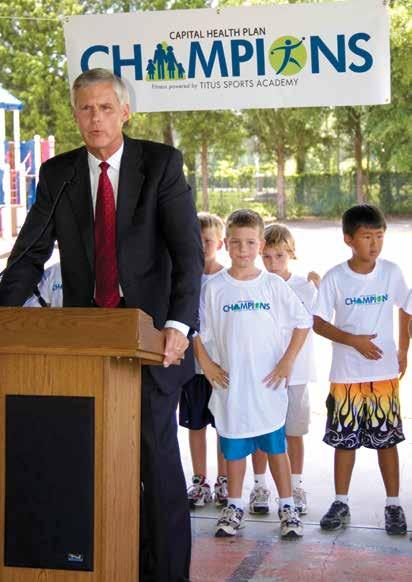
The key thing in secondary markets — and I don’t care if you are starting a health plan or a restaurant — is to do an outstanding job with the initial risk-takers who give you a chance to show them that you are a good value to them as consumers ”
— JOHN HOGAN, FORMER CEO AT CAPITAL HEALTH PLAN (CHP)


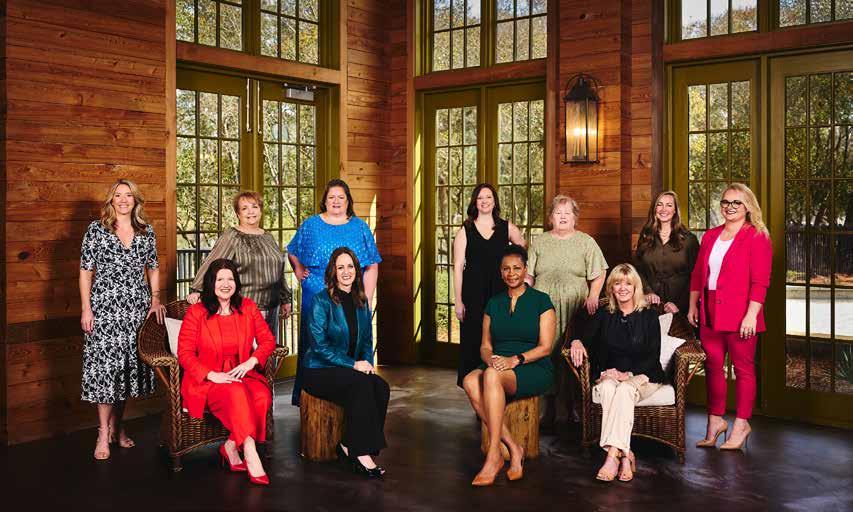
For the 10th year, Rowland Publishing, Inc. and 850 Business Magazine celebrated contributions made by outstanding Northwest Florida women.
The 2024 Pinnacle Awards luncheon, presented by gold-level sponsor Florida Blue, was held March 4 at the LakeHouse at the Watercolor Inn & Resort, a St. Joe Company property.
Rowland Publishing Associate Publisher McKenzie Burleigh served as master of ceremonies, discussed the genesis of the event initially suggested by the Gulf Power Co. and introduced a Pinnacle honoree from each of the program’s first nine years.
Year 10 honorees were introduced with videos produced by The Workmans of Tallahassee and featured the persons who nominated the award winners for Pinnacle consideration.
Heather Ruiz of Niceville, the marketing director at Bit-Wizards, a computer support and services business in Fort Walton Beach, received the Turnbull Award, reserved for a woman of demonstrated promise who is under the age of 40. The award is named for Marjorie Turnbull of Tallahassee, a longtime elected official and former executive director of Tallahassee Community College.
Aimee Nicole Sachs received posthumous Pinnacle recognition. A journalist and passionate baseball fan whose favorite place on Earth was a pressbox overlooking a field of play, Sachs died in Tallahassee on May 31, 2023, after suffering two strokes. The second one left her unable to move or communicate except by blinking her eyes. She was 38.
Her father, Ron Sachs, the founder and chairman of Sachs Media in Tallahassee,




paid tribute to his late daughter in remarks made at the awards luncheon. Movingly, he talked about Aimee’s decision to decline life support and become an organ donor. The lives of three people were extended when they received much needed organ transplants that were selflessly donated by Aimee as her last wish.
Sachs encouraged members of the Pinnacle audience to join the more than 11 million Floridians who have signed up to be organ donors by doing so at donatelifeflorida.org.
Renee Johnson, the events coordinator at Rowland Publishing, shouted out Florida Blue and additional luncheon sponsors and vendors: WaterColor Inn & Resort, The Workmans, Proffitt PR, Jennifer Albert (JA 30A Salon), Destin 30A Makeup Box, LIVE! In Tallahassee, Mingle 30A (balloon artistry), and Emerald Coast Florals & Event Design.
Steve Bornhoft, the former executive editor of 850 Business Magazine, said the character and caliber of honorees have
been the greatest factors in the success of the Pinnacle Awards program. He said that when the initiative was begun, Rowland Publishing had no idea how many deserving women it would find.
“Now, we recognize that the Pinnacle Awards program will be selfperpetuating,” he said. “Today’s honorees will inspire and bring about the next generation of women leaders.”
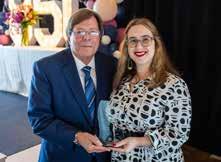
Members of the latest class of Pinnacle sisterhood inductees represented diverse occupational fields and community connections and included:
DeeDee Davis, Pensacola
CEO and Managing Broker, NAI Pensacola Commercial Real Estate
Rhea Goff, Panama City Beach
Senior Vice President, Chief Administrative Officer, The St. Joe Company
Lori Kain, Pensacola Director of Community and Government Relations, Global Connections to Employment
Leslie Powell-Boudreaux, Tallahassee
Executive Director, Legal Services of North Florida
Cissy Proctor, Tallahassee Managing Partner, LSN Partners
Kelly Reeser, Panama City Beach
Managing Director, TechFarms Capital
Sharon Robinson, Tallahassee Clinical Coordinator, Tallahassee Memorial HealthCare
Sue Semrau, Tallahassee Head Women’s Basketball Coach, Retired, The Florida State University
Susan Skelton, Tallahassee Administrator, Triumph Gulf Coast
Jennifer Steele, Santa Rosa Beach
Executive Director, Cultural Arts Alliance of Walton County
Chelsea Workman, Tallahassee Founder and Storyteller, The Workmans
Heather Ruiz, Niceville, Turnbull Award Winner
Marketing Director Bit-Wizards
Aimee Nicole Sachs, Tallahassee Honored Posthumously Hard-Charging Journalist who Thrived on Independence







To watch the entire event program, have access to event photos and more, scan the QR code or visit 850BusinessMagazine.com/women-leaders-honored.
It could be said that J.R. Long and Stewart Proctor were destined to be in business together. Their connection can be traced back to their grandfathers, who were also partners in various business ventures.
While the Long and Proctor families have been connected for generations, J.R. and Stewart’s ties didn’t fully strengthen until they began their careers in commercial real estate in the late 1990’s, whereby happenstance they shared the same office.
Both were hungry to learn all they could about commercial real estate, which led them to pursue CCIM educational courses in Atlanta, Birmingham and Orlando. During those car rides to and from Tallahassee, the two became friends who talked about goals and aspirations.
By the end of 2004, they opened their own company, Proctor & Long, LLC, a fullservice commercial brokerage in their hometown of Tallahassee, operating from an office in Midtown, where they still operate today.
The pair worked well together, agreeing on values and visions.
Even amid industry uncertainties, they’ve remained committed to their market and unwavering in client representation.
In 2010, they decided to merge with another partner to form a new company, Structure Commercial Real Estate and Management. For seven years, this partnership further solidified their reputable names in Tallahassee. However, when a buy-out opportunity presented itself, they returned to the partnership they began with.
Throughout this time, Proctor and Long were actively involved in the Florida CCIM chapter, a professional organization recognizing its members as experts in the disciplines of commercial and investment real estate. During these engagements, they met Ciminelli Real Estate Services principals Tom McGeachy and Hunter Swearingen, from Tampa, Florida.
Ciminelli Real Estate Services is an industry-leading, fullservice commercial real estate firm with over 23 million square feet of management and leasing assignments nationwide and over $500 million of capital



markets transactions in Florida. The company has offices in Florida, New York, Pennsylvania and Massachusetts.
Having successfully worked together on property management and receivership projects in Tallahassee during the recession, Proctor and Long decided to partner with Ciminelli in 2020 to lead the Northwest Florida operations.
“We still operate with autonomy in our Tallahassee market because we know this region and we have name recognition, but partnering with Ciminelli has given us the support to be able to be the efficient, active, boots-on-the-ground team that we are,” said Proctor.
As a result of all marketing, HR and accounting services processed by the Ciminelli Tampa office, the sevenperson Tallahassee team can focus on leasing, sales and the property management portfolio of 950,000 square feet of commercial space. Thriving in Tallahassee, Proctor and Long have set their sights on expanding their footprint west.
“Becoming a part of Ciminelli made sense because our company culture and goals aligned,” said Long. “We are all about building long-term relationships, serving our clients the best we can with honesty and growing our brand throughout the Panhandle.”

Florida, growth outpaces infrastructure

Phillip Gainer was frank.
“We have so many needs statewide that they outweigh our ability to stay ahead of them,” said the secretary of Florida Department of Transportation District 3, which extends from Escambia County east to Jefferson County. “We’re often in a position where we’re catching up. There is so much development and growth in the coastal areas. ”
And, Florida has 1,350 miles of coastline.
District 3’s efforts to compete for state transportation funding are complicated by the fact that while it is home to two of the 10 fastest-growing counties in the state — Walton and Santa Rosa — its population is the smallest among the state’s seven transportation districts.
Under the circumstances, the best any district can do is to apply a process for prioritizing projects and knock them off the list as funds become available.
That prioritizing work with regard to most types of transportation infrastructure, or “facilities” in DOT parlance, is accomplished by Transportation Planning Organizations. There are four in the district.
The Florida-Alabama TPO, so called because Baldwin County, Alabama, figures in its considerations, is chaired by Escambia County Commissioner Robert Bender; it comprises Escambia and Santa Rosa counties. The Bay TPO, limited to Bay County, is chaired by Callaway Mayor Pamn Henderson. Wakulla County Commissioner Quincee Messersmith chairs the Capital Region Transportation Planning Agency, which includes Gadsden, Jefferson,
Leon and Wakulla counties. An Okaloosa County commissioner, Nathan Boyles, chairs the Okaloosa-Walton TPO.
“The TPOs set priorities for their areas in categories that range from traffic signals and intersections to multi-use trails and capacity projects,” Gainer explained. He added that the district, itself, makes decisions regarding resurfacing work and bridge replacements. In addition, the district assesses requests for projects made by rural cities and counties that are not represented on a TPO. In District 3, those counties are Calhoun, Franklin, Gulf, Holmes, Jackson, Liberty and Washington.
Decisions about interstate maintenance are made on a statewide basis.
Gainer mentioned, too, Strategic Intermodal System (SIS) funding as a factor in completing projects in areas where population densities are not currently high but growth is coming.
The SIS is a high-priority network of transportation facilities deemed important to the state’s economy and mobility. Created in 2003, it focuses transportation resources on facilities that are key to interregional areas and interstates. The SIS is the state’s highest priority for transportation capacity investments — typically the addition of traffic lanes — and a primary vehicle for implementing the Florida Transportation Plan (FTP), the state’s long-range transportation vision and policy plan.
“SIS is how we have been able to four-lane highways 331, 79 and 77 between U.S. 98 and I-10,” Gainer said.




He concedes that some projects may proceed while not registering as priority concerns in the minds of most motorists. The construction of a $5.6 million pedestrian underpass and related improvements at County Road 30A and U.S. 98 in Walton County falls into that category.
“We have different categories of priorities including pedestrian facilities,” Gainer said. “Walton County came to us after the underpass had been made a priority by the Okaloosa-Walton TPO. They partnered with us financially, so we didn’t pay for all of the right of way and all of the facility. By bringing funds to the table, they made it possible for us to move from a conventional pedestrian crossing to a tunnel.”
Gainer said contributions made by residents, businesses and local units of government and special legislative appropriations all may figure in covering costs for transportation projects.
“Sometimes, a local government will fund a project now for reimbursement later,” he said. “If there is a signalized intersection that needs to go in, our process takes a little bit longer, but if a county wants to put one in, like at an intersection of U.S. 98 and a county highway, we’ll allow them to put that signal in as long as it meets our design specifications.”
Gainer said construction in Bay County of a bridge over Crooked Creek and a new State Road 388 leading directly from the mega Latitude Margaritaville Watersound development to the Northwest Florida Beaches International Airport is an example of choosing an alignment that was less expensive than expanding an existing roadway.
“If you look at 388 from the airport to 79, there are a lot of homes along that stretch, and if you want to four-lane a two-lane facility, you need a lot of additional right of way,” Gainer pointed out. “Sometimes, it’s easier to get the necessary right of way in a new area so that you don’t have to buy each residential house or take people’s front yards. From a permitting standpoint, it’s easier to get pond sites away from homes.”
Travel highways including State 79, and you may see ponds surrounded by chain-link fencing. They serve as detention and retention ponds that collect stormwater runoff and allow for the settling out of pollutants.


The six-laning of U.S. 98 in Destin and now Panama City Beach are examples of projects that may take 10 to 12 years to complete, beginning with feasibility and environmental analyses. Right-of-way acquisition may consume two years, especially if eminent domain proceedings are involved, Gainer said.
When construction proceeds, the DOT endeavors to minimize disruption of traffic flows that may be viewed by some people in a project area as protracted.
In four-laning a road, Gainer said, DOT may strive to acquire enough right of way so that when it is eventually six-laned, the expansion can take place in the middle of a corridor, thus minimizing impacts. Additionally, he said, paving work may be scheduled for nighttime hours, but doing so does present additional risks to contractors’ employees.
“If we are working in a residential area, people don’t like all the banging of the tailgates and the equipment noise when they are trying to sleep, but we ask for their patience and remind them that resurfacing occurs only once every 12 or 15 years,” Gainer said.
Maintenance of I-10 is always a District 3 priority.
“It’s the backbone of our district,” Gainer said. “It is important to the ports in the region. We’re looking at six-laning some areas around Tallahassee and in Escambia County to move the trucks through as best we can.”
At the suggestion that I-10 is better maintained than I-75, which is said many times to be in a state of “perpetual construction,” Gainer laughed. Heartily. ▪

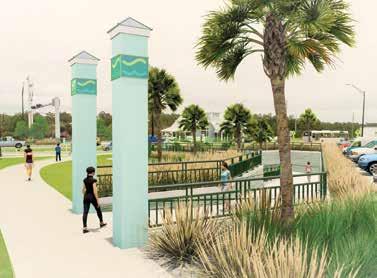

Sometimes, a local government will fund a project now for reimbursement later. If there is a signalized intersection that needs to go in, our process takes a little bit longer, but if a county wants to put one in, like at an intersection of U.S. 98 and a county highway, we’ll allow them to put that signal in as long as it meets our design specifications.”
— PHILLIP GAINER, THE SECRETARY OF FLORIDA DEPARTMENT OF TRANSPORTATION DISTRICT
In September 2023, the Walton County Commission adopted a Mobility Plan & Mobility Fee Technical Report prepared by Nue Urban Concepts, a Destin consulting firm. That plan served as the basis in December of last year for the passage by the commission of a mobility fee ordinance. Fees are assessed against development activity and are calculated to pay for mobility projects planned to meet needs arising from population growth and increased traffic volumes. In Walton County, that growth figures to be robust. Walton is currently the fourth fastest-growing county (percentage population growth) in Florida, according to the Bureau of Economic and Business Research at the University of Florida. Its population grew by 36.8% between 2010 and 2020. Another Panhandle county, Santa Rosa, is 10th (24.2%). Following are excerpts from the consultant’s report. — Steve Bornhoft

In 2013, the Legislature encouraged local governments to adopt alternative mobility funding systems. Mobility fees, based on a plan of improvements (mobility plan), are an alternative funding system that allows development to equitably mitigate its transportation impact through a streamlined and transparent one-time payment to local governments. In 2019, the Legislature required that mobility fees follow the same statutory process requirements as impact fees.
Walton County’s 2045 Mobility Plan is a vision over the next 21 years to further develop an efficient, safe and connected transportation system that provides travel choices for all users. The Mobility Plan features a mixture of mobility projects such as sidewalks, paths, trails, bicycle lanes, road widenings and new complete streets to meet the needs of a growing community.
EDITOR’S NOTE: The North Assessment Area includes Paxton and extends to the Alabama line. The North Central Assessment Area encompasses an area that includes DeFuniak Springs. The South Central Assessment Area includes Freeport. The South Assessment Area runs along the Gulf Coast and includes Santa Rosa Beach. One-time mobility fees vary based on land use categories and classifications, units of measure and assessment areas. For example, the mobility fee for a detached, single-family residence is $1,362 per 1,000 square feet in the South Walton Assessment Area. That fee per 1,000 square feet in the North, North Central and South Central assessment areas is $356, $629 and $735, respectively. Municipalities may opt in to the Walton County Mobility Fee system but are not required to do so.

The Mobility Fee features four Assessment Areas and four Benefit Districts based on the county’s existing Planning Areas.
Benefit Districts ensure that Mobility Fees are spent on mobility projects to the benefit of the development activity that paid the Mobility Fee. The bases for Walton County’s Mobility Fee are the projects identified in the 2045 Mobility Plan.
The Walton County 2045 Mobility Plan is a vision for how the county’s transportation system will transition from one focused primarily on moving cars toward a multimodal system focused on providing safe and convenient mobility and accessibility for people of all ages and abilities. The Mobility Plan will serve as a guide to proactively plan for and prioritize multimodal projects. It also seeks to facilitate the development of park-once environments along 30A and Scenic 98 to
encourage visitors to the county’s beach communities to park once and use other forms of transportation to explore their destinations.
The county desires to enhance safety, convenience and connectivity for all users of the transportation system. The multimodal projects in the Mobility Plan lay the foundation for the county to consider the development of a program to move toward Safer Streets for All.
There are two primary components in moving toward Safer Streets for All: mobility projects and speed. The first component is achieved through the 2045 Mobility Plan. The second component is achieved through lowering the speeds at which motor vehicles can travel. As speeds increase, so does the probability that a crash involving people walking, bicycling or driving will result in one or more fatalities. ▪
Lost Key Golf Club is an 18-hole Arnold Palmer Championship public golf course that provides players with an unsurpassed golf experience. Five tees, stunning visuals, and a unique playing experience for all skill levels.
Come join us at Grille 625 in the new Palmer dining room. Grille 625 features many culinary pleasures for the palate highlighted by beautiful, pristine views of our championship golf course.
The Lost Key Golf Club offers elegant spaces for your special events from corporate events, to weddings, social events and more! Our club staff is committed to making your event a joyous and memorable occasion.







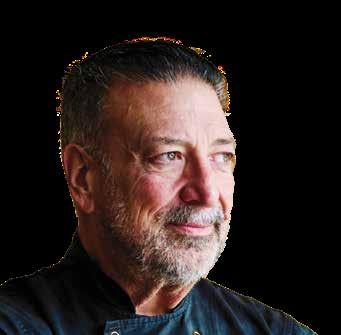

←
Chef Chris Trovas’ latest restaurant venture, Wild Olives 30A, is a reimagining of the original Rosemary Beach location. For his new vision, Trovas went no-holds-barred on space, design and offerings.
story by STEVE BORNHOFT
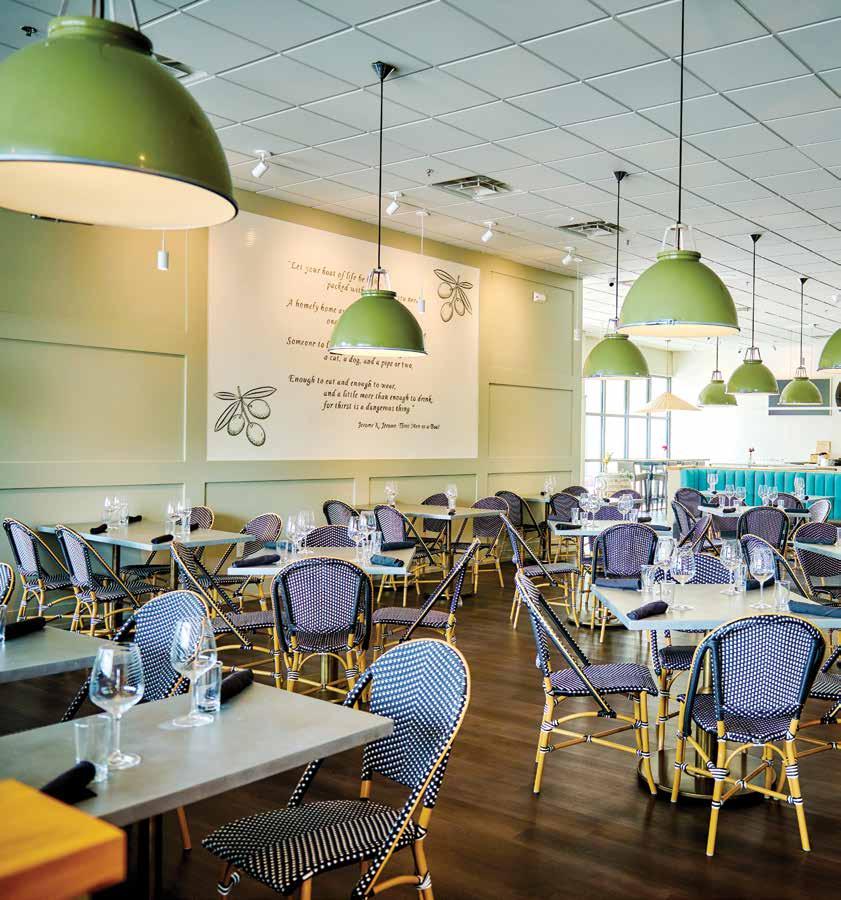
by DAVE BARFIELD


Chef Chris Trovas beamed as he reflected on the private, Italian wine tasting dinner he had served the night before.
He values such occasions as opportunities to push himself and truly shine.
← ↑ An
“We had big boards with picanha steak on them,” Trovas described the fare. “Brussels sprouts. Parsnip puree. We had pork osso bucco for the main course and paired it with a Barbaresco and a Barolo, side by side.”
Both wines are made from nebbiolo grapes, Trovas explained, but Barbaresco is a traditional, young, fermented wine, whereas a Barolo spends three years in the barrel and two years in the bottle before it is sold.
“The response was amazing when the diners discovered the difference between the two wines,” the chef said. “It was an eye-opening part of the dinner.”
Trovas thrives on delivering enjoyable, memorable and sometimes unexpected experiences to diners. He had thought about retiring before committing to his latest project, Wild Olives 30A, located in a new Ricky Ruckus development on South Walton’s renowned scenic highway.
“Building it was a big ordeal, but after being in the business for basically my whole life, I wanted to have my dream restaurant,” Trovas said. “Everything I ever wanted in a restaurant and never had, I tried to put in this one. Ninety-nine percent of it came out exactly like I wanted it.”
Trovas said he wanted his building to have a South Beach VIP vibe and feel. To achieve that goal, he retained designer Walt Chancey, who has been active lately in creating spectacular homes at Alys Beach.
Trovas has been intrigued by food preparation since he was a small boy growing up in Texas. His mother used to place a bar stool in front of the kitchen sink so that young Chris could help out by washing the dishes. He always wanted to be in the kitchen.
At the University of Houston, Trovas majored in hotel and restaurant management and played middle linebacker and long snapper on the football team. Before he had his first restaurant, he worked for Weston Hotels.
Yielding to wanderlust, Trovas departed Texas in the early 2000s, headed, he thought, for Key West. He never made it.
“I came through this area, fell in love with it and decided to stay,” Trovas said.
In 2005, he opened a restaurant in Rosemary Beach that he would operate for 15 years. It emphasized Mediterranean cuisine, just like Wild Olives 30A, but was less than a third of the size of his new place.
“Rosemary Beach was a classic little Norman Rockwell town,” Trovas said in recalling his early days in South Walton. “It’s been amazing to watch the evolution of 30A. I used to joke that if you had a blowout and wound up at the side of the road, you would be alligator food because no one would find you. Now if you have a blowout, you’ll immediately run into someone on a bicycle or a golf cart, and you’ll be right in front of a house.”
At 7,000 square feet, Wild Olives 30A seats 141 and offers something that the Rosemary Beach location did not: a full bar.
Nick Robison is the bar manager, and Trovas raves about him.


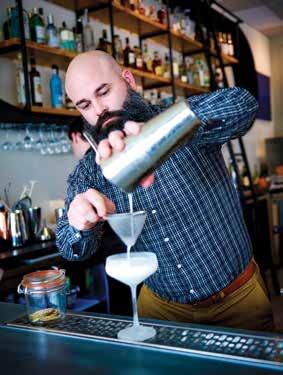
↑ While the tuna poke and paprika chicken are new menu mainstays, dishes like the Greek-style catch will rotate the featured fish daily based on Gulf-fresh deliveries.
Barrel-aged Old Fashioned; Front-of-house manager Slayde Martin (above right) oversees it all while crafting signature cocktails and curating wine pairings.


“He’s like a chef,” he said. “The staff sampled his cocktails before we opened. He’d make a margarita, and we all agreed it was a good drink, and then he’d add a drop of rose water or orange extract and it was over the top. Watching him prepare his cocktails is exciting for me because it’s very similar to what I do.”
While the bar is a welcome new complement, Trovas is a chef with a passion for wine.
“We named it The Wine List,” Trovas said of the wine shop that adjoins Wild Olives 30A. “You can pick any bottle of wine you want, bring it back to the restaurant and we will give you full wine service. And there is no corkage fee.”
Slayde Martin, a Texas native like Trovas, is the front-of-house manager and is easily recognized with his shaved head and trophy beard.
“He does it all,” his boss said. “I just boil water.”
Martin’s wife, Alicia, is the personal assistant to Trovas and the management team. Jeff Simpson is Trovas’ right-hand man in the kitchen and worked with him in Rosemary Beach. Prospective employees complete a five-day tryout period after which the chef decides if they are keepers.
“I am very, very fortunate,” Trovas said. “I have the best staff on 30A. At the restaurant, we are all part of a family, and people can sense that.”
With the larger restaurant has come more expansive menus. Trovas has added several vegan options. He endeavors to source his produce locally and obtains never-frozen fish from seafood dealers in Destin, Panama City and Apalachicola.
On Trovas’ dinner menu, the seafood entrees are all listed as “catch” versus specific fish species.
“Every day is different,” Trovas said. “I don’t know what the boats are gonna catch. In the last few days, we’ve had

Wild Olives 30A is located at 4771 E. County Highway 30A in South Walton County. To check out his latest menu, visit wildolives30A.com.
golden tilefish and cobia. One day, they brought me yellowfin tuna.”
Trovas gets grass-fed, free-range beef from Joyce Farms in North Carolina.
“It’s a spectacular product, the best,” he said. “It makes me look like a really good chef.”
Trovas, 60, shares a home on Choctawhatchee Bay with his black lab, Bear. Privacy affords him uninterrupted periods in which to think about menus and dream up dishes with which to freshen his menus, something he does quarterly.
“Life outside of the restaurant doesn’t exist,” Trovas said. “I treat this place as if it were my own home. It’s long hours, but I get the enjoyment of watching people thoroughly enjoy fine food. When somebody turns to me and says, ‘Oh, you paired the prawns with this flavor profile with this vermentino that we were drinking, and it was perfect,’ I get tremendous satisfaction from that.” ▪
story by DAVID EKRUT, PH.D.
Floridians are resilient when it comes to disaster recovery. According to a study by WalletHub, Florida was the fourth most severely impacted state in the nation in terms of losses resulting from natural disasters from 1980 to 2023.
During that period, the state sustained 20 climate events each producing in excess of $1 billion in damages. Coastal counties regularly experience hurricanes and tornadoes and even blue-sky events, along with sea-level rise, algal blooms, fires and floods.
In the case of major events like Category 5 Hurricane Michael in 2018, disaster recovery can take years and require coordinated efforts across county and state lines.
A man-made disaster, the 2010 Deepwater Horizon oil spill, dumped nearly 5 million barrels of crude into the Gulf and affected beaches and ecosystems from Texas to Apalachicola. Wildlife, reefs and flora are still recovering.
In response to the oil spill, the Florida Legislature created Triumph Gulf Coast, Inc., a nonprofit
organization tasked with dispersing settlement funds paid to the state by BP. Moving beyond recovery, Triumph is now focused on assessing applications from public entities seeking funding for projects aimed at strengthening and diversifying the regional economy in Escambia, Santa Rosa, Okaloosa, Walton, Bay, Gulf, Franklin and Wakulla counties.
Currently in the pipeline are 27 proposals that have gained preliminary approval. They include one titled Adventure Within Reach. Submitted by VISIT FLORIDA in partnership with FloridaCommerce, it is intended to boost Northwest Florida tourism.
Separate from potential Triumph funding are Tourist Development Tax (TDT) revenues collected by counties throughout Florida. In Walton County, that tax, which is charged on short-term rentals, is 3% north of Choctawhatchee Bay and 5% south of the bay. According to the Walton County Clerk of Courts & County Comptroller, the South Walton TDT generated just over $60 million in fiscal year 2023, and the North Walton TDT produced $267,348.


↙
The research vessel DEEP STIM III as it appeared just before its sinking. Anchor line helped control its downward trajectory and path to the bottom of the Gulf of Mexico. ↙ The ship begins to sink; the bow is partially submerged. Holes were cut in the hull in strategic locations, allowing inflow of water that filled the ship and ensured that it came to rest in the intended orientation.
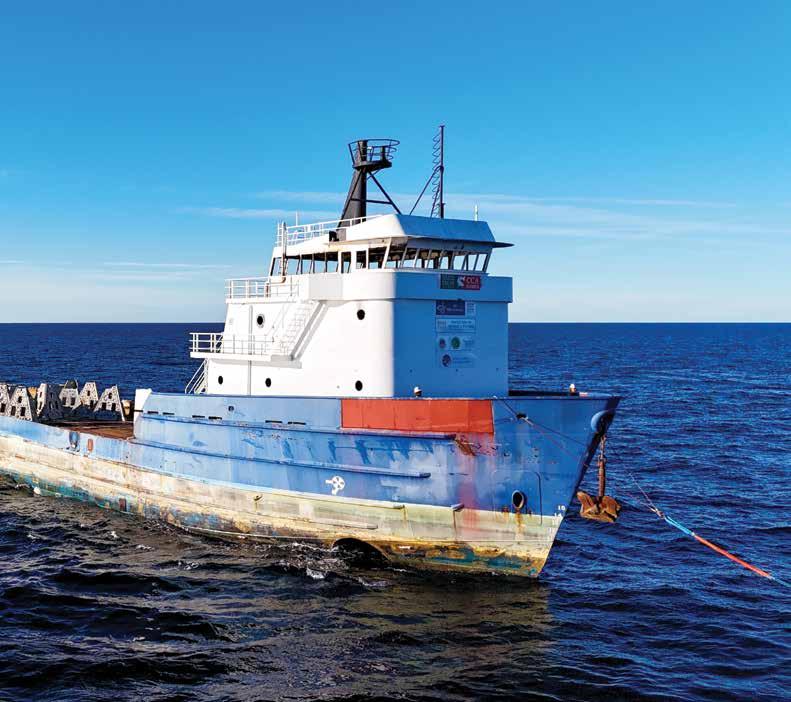
Matt Algarin, the director at Walton County Tourism, favors a regional outlook on tourism promotion like that embraced by the VISIT FLORIDA proposal.
“Promoting the region is equally as important as promoting the destination,” Algarin said.
That sentiment is shared by Algarin’s counterpart, Jennifer
Adams Kemp, who leads the tourism promotion organization Destin-Fort Walton Beach.
“We would rather them stay in the region than go somewhere else, even though they may not get to me the first time,” she said. “They will get to me at a later date.”
That regional approach has manifested itself in recent years in
a broader effort across counties to promote all of Northwest Florida rather than any specific beach or location.
“We all have the same sand and water, from Escambia to Wakulla,” Algarin said.
Individual counties each have their respective attractions, but there is nothing to prevent visitors from parasailing off Panama City Beach one

day and cooling off at Vortex Spring in Holmes County the next.
The greater goal for Algarin is to spread awareness that there are adventures within reach for anyone who visits Northwest Florida.
Those adventures can take place above and under the water.
“We have a multiyear plan to grow the artificial reef network,” Kemp noted.
Artificial reefs come in many shapes and sizes and are generally constructed of steel, concrete or limestone. Various types of marine life attach to their surfaces and in turn attract crabs, fishes and other foodchain members.
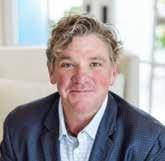

Andy MacAlexander is president and founder of the South Walton Artificial Reef Association (SWARA), a nonprofit that works with private and government entities to get more reefs onto the Gulf floor.
Recently, SWARA participated in the sinking of a decommissioned 239-foot research vessel, the DEEP STIM III, 16.5 miles due south of Walton County. The sinking was celebrated as a tri-county artificial reef project. Visit Panama City Beach, Walton County Tourism and Destin-Fort Walton split the $750,000 cost to acquire, clean and deploy the ship, which was brought to Florida from Louisiana.
T he Emerald Coast Reef Association and SWARA added reef modules to the ship’s deck, and the Coastal Conservation Association paid for towing.
“Can’t be a pirate until you sink a ship,” MacAlexander joked when asked about why he became involved in the project.
MacAlexander, a lifelong diver, said the return on investment in artificial reefs is far greater than the cost.
“For every dollar you put down, the community is getting 30 to 120 back,” he has calculated.
The STIM III immediately showed promise as a fish attractor. Within
The STIM III immediately showed promise as a fish attractor. Within hours of its sinking, I spied hundreds of red snapper checking out the wreck. Red snapper are a popular game fish that frequently top 20 pounds; fillets fetch $15–$20 a pound at area seafood markets.” — ANDY MACALEXANDER , PRESIDENT AND FOUNDER OF THE SOUTH WALTON ARTIFICIAL REEF
ASSOCIATION
(SWARA)














































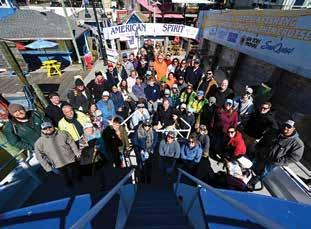
↑ Tetrahedron modules (three-sided pyramids composed of concrete and limestone) were added to the deck of the vessel to give more complexity to the new artificial reef. Deployment sponsors, stakeholders, volunteers and spectators gathered on the day of the DEEP STIM III’s sinking. Tourism promotion organizations in Bay, Walton and Okaloosa counties helped make the project possible.
hours of its sinking, MacAlexander spied hundreds of red snapper checking out the wreck. Red snapper is a popular game fish that frequently tops 20 pounds; fillets fetch $15–$20 a pound at area seafood markets. And, the fish provides a food source for dolphins and other large predators.
“This one was a success,” MacAlexander said, adding all three counties are on board to sink another ship soon. ▪
216,482
3,389



↗ Freeport Mayor Russ Barley outside City Hall. When Russ Barley became mayor, Freeport’s Planning Department was a one-person operation. Quickly, it grew to the point where it took over the city’s community center. Now, a new, 4,000-square-foot center is under construction. In 1990, Freeport numbered 873 residents, according to the U.S. Census. As of late 2023, Barley said, the population had reached 12,780. Another 14,859 people live in the city’s utilities service area.
Growing Freeport works to preserve its small-town atmosphere
story by STEVE BORNHOFT
Russ Barley didn’t know precisely what to expect when he became mayor of Freeport, the small Walton County city where he grew up. He would discover that people contact the mayor’s office regarding a wide range of problems, fully expecting the city to solve them.
Many people, Barley said, believe the city is empowered to unilaterally make improvements or changes to a state or federal highway that happens to pass through town. Others call with problems that lie beyond the purview of city operations and are appropriate to private-sector solutions.
In his first term as mayor, Barley was visited by an older woman who was convinced that she had bats in her attic. He might have simply referred the woman to a wildlife removal service but instead made an earnest effort to help her out.
He called the nearby E.O. Wilson Biophilia Center and learned that it was home to an expert on bats who was willing to visit the woman’s home. Upon doing so, the bat man found that the attic was free of flying mammals; there wasn’t the first splat of guano up there.
“The homeowner’s daughter later told me that her mother just thinks she has bats,” Barley said.
Barley shared the phantom bat story with Gene Wright, then the mayor of Malone, in Jackson County.
Wright had a “Silver Bat Award” plaque made, recognizing his
colleague for having gone beyond the call of duty in responding to a case of bat hysteria. He “slightly embarrassed” Barley by presenting the plaque to him at a Northwest Florida League of Cities meeting.
Visitors to Barley’s office can’t miss the award, despite its modest 4-by-6 inches in size. When the mayor is seated at his desk, it is right over his left shoulder.
The plaque is emblematic of the approach that Barley takes to his role as mayor. He reports to City Hall five days a week in suit and tie, meanwhile leaving the operation of his three businesses in town — a flower shop and women’s and children’s clothing stores — to his employees.
“I am a full-time mayor,” Barley said. “I am here if someone wants to speak to me, and I can answer their questions or get an answer for them. I don’t want anyone answering questions for me.”
In 2013, Barley defeated 22-year incumbent Mickey Marse, 366 votes to 160, to win the office he has held ever since. Marse’s father was Freeport’s first mayor following its incorporation in 1963. Barley’s father was its second.
“When I decided to run for mayor, it was because I didn’t see much growth in Freeport,” Barley said. “I would go to high school graduations, and that was the last I’d see of the students. They would just leave; there was nothing here.”
Barley didn’t hang around long himself after graduating from Freeport
High School. He attended what was then Okaloosa-Walton Junior College for two years and then enlisted in the Navy. He served for five years, two of them in Newfoundland, and was honored to be named a personnel man.
Upon separating from the military, Barley worked at a Veterans Administration hospital in Jackson, Mississippi, and opened a flower shop there.
“I have a God-given talent in the floral industry,” he said.
He moved to Jacksonville and worked for a big flower shop there before starting his own. Thirty-four years ago, he completed a large loop, returning to Freeport and setting up shop in Santa Rosa Beach.
“People used to say, ‘You live in Freeport?’ like they couldn’t believe it,” Barley said of his 19 years doing


business on the coast. “Now, people are moving from Destin to live here.”
Barley moved his shop inland when he was satisfied that Freeport had become big enough to support it.
“I am doing very well,” he said.
When Barley became mayor, Freeport’s Planning Department was a one-person operation. “Now, we have six or seven people in Planning,” he said.
The department grew so quickly that it took over the city’s community center. A new, 4,000-square-foot center is under construction.
In 1990, Freeport numbered 873 residents, according to the U.S. Census. Twenty years later, it had grown to just 1,787 souls. As of late 2023, Barley said, the population had reached 12,780. Another 14,859 people live in the city’s utilities service area.
In recent years, Freeport has been the fastest-growing city in Florida, percentage-wise.
Barley likes to make the rounds in Freeport, delivering progress reports to service clubs and other gatherings.
He talks about efforts by the city to develop infrastructure in anticipation of growth rather than in response to it. He cites work to expand the city’s existing wastewater treatment facility and its plans to build a second one on the east side of town.
He discusses plans to build a road that will extend from the Hammock Bay development to U.S. 331 at Marquis Way, thus relieving congestion at the north-south highway’s intersection with State Road 20.
He lists businesses that are new to town: Circle K, Pizza Hut, Emerald Coast Title Co., 331 Noodles, Tool Expo, Otto’s Car Wash.
He cites development orders — approved, pending and anticipated — and says that the city can be expected to grow to 30,000 in population in the next 10 years.
“People often ask me when we are going to get a big-box store,” Barley said. “We don’t recruit businesses like that. They do their own market research. The numbers will tell them when it’s time to come here.
photography by MIKE FENDER
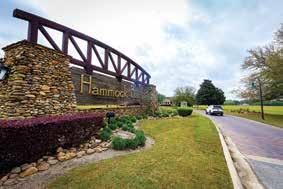
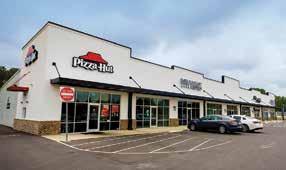
“When I was elected, it was a goal of mine to have a hotel in Freeport,” Barley said. “Now, we’re about to have four.”
Freeport has reached the point where it doesn’t have to give itself away.
Barley noted a California fabrication business that had an interest in coming to Freeport. The city was willing to provide the suitor with incentives including land in exchange for high-paying jobs.
“But it got to the point where they wanted the city to practically set them up in business,” Barley said, “and the council decided to suspend talks with them.
“We’re still a laid-back community,” Barley said in describing Freeport’s appeal. “People see all the waterways that we have around here, and that’s attractive to them. And, we’re just 15 minutes from the Gulf of Mexico.
“We have lots of military here and retirees from up north, and we’re seeing young people moving in. I ask myself how they find out about Freeport, what they do when they get here and how they can afford to live here. I’m not sure I’ve figured that out.”

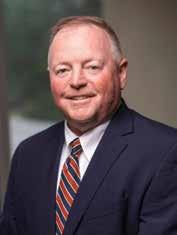
Whenever I have a question, Warren Averett is quick to respond. They have thoughtful and thorough solutions to my problems. —Anne Zamitalo, American Countertop A Warren Averett Manufacturing & Distribution Client Contact Kevin Bowyer today to see how we can help you.
Kevin Bowyer, CPA, CITP, CISA, CDPSE Destin Managing Member 850.337.2422
Kevin.Bowyer@warrenaverett.com


In Freeport, Barley said, the average price of a home is $450,000. Apartments rent for $1,500 to $2,000 per month.
“We have more people all the time, and they all want to keep the small-town atmosphere,” Barley said.
He promotes events that bring people together and provide a sense of community: Bayfest, Night at the Park, the Mayor’s Ball, the Spring Festival/Eggstravaganza. The city has plans to enlarge its library. It has a modest museum, sometimes staffed by volunteers. If no volunteer is present on a given day, Barley said, “We’ll give you the key, and you can have a look around yourself.”
Barley is 75. He underwent quintuple bypass surgery in 2017. He has survived rectal cancer and is not sure if he will seek a fourth term.
“I’m thinking and praying about it,” he said. “Things aren’t the same. We’ve got a city manager now.”
Every day on the way to his office, Barley passes by a collection of old photos curated by the late town historian, Beckie Blount Buxton. He passes by dozens of framed portraits of Miss Freeports.
“I am here for a reason,” Barley said confidently. “There is still more for me to accomplish.” ▪
83,304

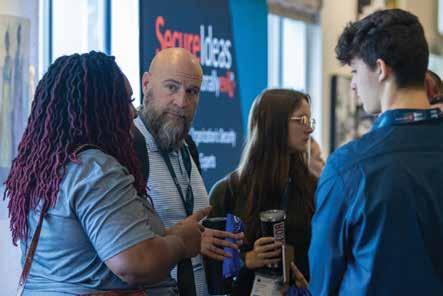

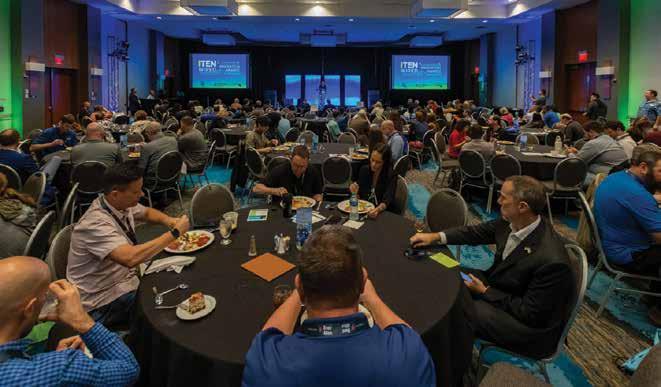

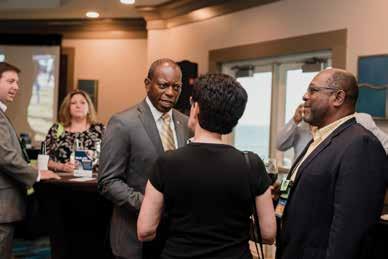
The southeast’s premier cybersecurity and IT conference.
Hilton Pensacola Beach
October 16-18, 2024
story by HANNAH BURKE
In 2005, a group of friends, united by a passion for fine wine and a philanthropic spirit, decided to host a silent auction to benefit children in need in Northwest Florida.
To their delight, the event raised around $80,000 and laid the groundwork for what would become the Destin Charity Wine Auction Foundation (DCWAF). As of last year, the organization had distributed $32 million in donations to children’s charities in Escambia, Okaloosa, Walton and Santa Rosa counties and benefitted an estimated 100,000 youths.
With a staff of four, a board of directors, trustees and partnerships with 17 different charities, DCWAF’s mission is the same as it was in the first place: better the lives of abused, infirm and disadvantaged children through special, wine-related events.
For DCWAF president Karah Fridley-Young, there’s nowhere else she’d rather be.
“I’ve been with DCWAF for about 11 years now, and as soon as I graduated college, I sought out this job,” said Fridley-Young, a Destin native. “Even if I won the lottery, I’d be right here in this position, giving back to the community that raised me.”
At this writing, Fridley-Young and her team were gearing up for DCWAF’s signature wine auction weekend, a two-day
↓↗ Activities conducted by the
its Harvest Festival, seminars and a Galentine’s gathering. In 2023, the




event featuring private patron dinners curated by local chefs and celebrity vintners; a wine tasting and silent auction; and a live auction, where attendees bid on exceptional wines, getaways and other highly prized items.
For a decade, Wine Spectator Magazine has ranked the experience as one of the top charity wine auctions in the United States.
“That success is accomplished through collaboration,” Fridley-Young said of the event, which raised $3.4 million in 2023. “It is our board. It is our sponsors and our vintners, chefs and volunteers.”

“It is hard work to fundraise,” added DCWAF director of marketing and communications Kate MacMillan. “It speaks to the caliber of our supporters and what they’re willing to invest in our community and us.”
MacMillan said DCWAF’s fundraising efforts take place year-round. According to its financial report for 2022–23, DCWAF raised $175,000 at its sixth annual Harvest Wine & Food Festival in Sandestin and $75,600 at its second annual Galentine’s event.
Fridley-Young and MacMillan reflected on the success of the 2024 Galentine’s gathering,
One of the causes we supported was providing supplies for period poverty. Point Washington Medical Clinic and one of our newest partners, Caring and Sharing of South Walton, applied for a grant with us that would help supply female hygiene products to girls, along with education on how to use those products safely.”
— KATE MACMILLAN, DCWAF DIRECTOR OF MARKETING AND COMMUNICATIONS

which raised over $100,000 for girls served by eight charities. Dozens of ladies, dressed in pink, of course, came together to celebrate women in business in Northwest Florida, exchange stories and indulge in a little vino.
“It was a beautiful and cathartic afternoon,” Fridley-Young recalled. “It was a room full of all women, sharing some very personal experiences and moments that shaped their lives and engaging in conversations that wouldn’t happen if there was a single man in the room.”
DCWAF also supports the Emerald Coast Children’s Advocacy Center (ECCAC). Sadly, there are times when girls who have been sexually assaulted arrive at the center and must turn their clothing over to investigators as evidence. DCWAF helps provide these children with new attire, as well as a gift card to purchase an item of their choice to help them regain a sense of control and comfort.
ECCAC chief executive officer Julie Porterfield said DCWAF has given the advocacy center
“One of the causes we supported was providing supplies for period poverty,” MacMillan said. “Point Washington Medical Clinic and one of our newest partners, Caring & Sharing of South Walton, applied for a grant with us that would help supply female hygiene products to girls, along with education on how to use those products safely.”
↑ Pinks and reds dominated attire at the DCWAF’s Galentine’s gathering, an event that raised $100,000.
↗ Organizations supported by DCWAF include the Emerald Coast Autism Center; an auctioneer solicited bids during Wine Auction weekend.
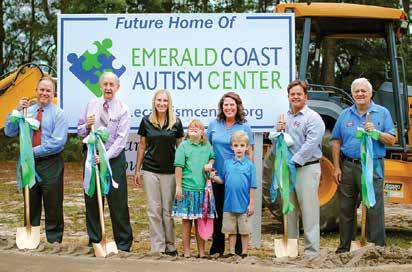
$2,740,500 since 2009. Those funds have mightily aided efforts to “restore lost innocence” through advocacy, therapy and safe havens for children who have been neglected and abused.
“Last year, we were able to open an office in Fort Walton Beach to focus on children in neglectful situations through our CARES program, which works with children and their families to either keep them out of the system or get them out of the system very quickly,” Porterfield said. “As we develop new programs, DCWAF’s funding has helped support us. Right now, we’re seeing about 1,200 children a year, and DCWAF has impacted every one we serve. They are helping grow a healthy place for children to thrive in our community.”
DCWAF will mark its 20th anniversary next year, and Fridley-Young said they are already looking toward the next 20 years.
“Going forward, our biggest goals are to continue the trust within our donors to make sure their dollars have the biggest impact they can,” she said. “We want to continue to raise the bar each year, reach more children than we have before and ultimately help end the issues plaguing the children of our community.”
DCWAF has begun to solicit legacy gifts and plans to continue building awareness through small wine education events while adding more nonprofit partners.
“The concept of being able to get to a place where every dollar cuts through operational costs and just goes straight to the kids is, for us, very meaningful,” MacMillan said. “Figuring out how to get to that place is something we will continue to explore.” ▪


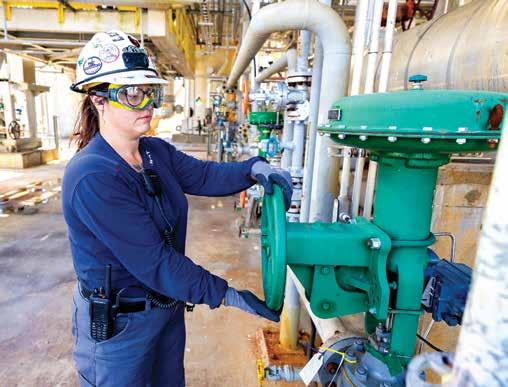
story by AL KRULICK
Until George Eastman developed a flexible film and the portable Kodak box camera in the late 1880s, photography was too expensive and difficult for the amateur enthusiast to enjoy.
By 1920, his company, located in Rochester, New York, not only sold film and cameras but also took on developing his customers’ exposures. At that point, he needed to create his own independent and reliable supplier of the chemicals required by his booming photographic business. He established a subsidiary of the Eastman Kodak Co. in Kingsport, Tennessee.
Over succeeding decades, the Eastman Chemical Company researched, refined and manufactured a broad array of chemicals, fibers and products, thousands of which are used every day by consumers across the globe. In 1994, the Eastman Chemical Company became an independent corporation. Today, it has 14,500 employees and operates 36 manufacturing sites in 12 countries.
In 2014, Eastman Chemical acquired the Taminco Corp., a global specialty chemical company, including its plant located in Pace in Santa Rosa County. Today, the facility
employs a little over 100 workers and has about 50 resident contractors.
Its main products are various types of amines —- derivative compounds of ammonia, made by replacing some of its hydrogen atoms with hydrocarbon groups via a chemical reaction with various types of alcohol.
These “functional amines” and their derivatives serve as key building blocks in a broad array of chemical products with a wide range of applications, including agriculture, manufacturing, water treatment, personal and home care, pharmaceuticals, animal nutrition, and oil and gas end markets, among others.
For example, dimethylamine (DMLA) is a building block in surfactants, which are chemical compounds that decrease the surface tension between two liquids, a liquid and a gas, or a liquid and a solid — thus its use in soaps and detergents.
When Eastman acquired Taminco, the two businesses were aligned not just as chemical manufacturers but as companies that prioritized innovation, safety, sustainability and support for workers. Eastman, himself, was an early provider of worker benefits, including a welfare fund to provide for workman’s compensation in 1910 and profit sharing for all employees in 1912.
To this day, employment at Eastman Chemical is much sought-after.
“We treat our employees well at Pace, so we have a very low turnover rate,”
photography by MIKE FENDER

said site manager Shane Fowler. “And it’s not a huge factor for us to recruit and retain employees. When we do have openings, we have a lot of applicants, and we’re looking for the highest quality ones that have industry experience.”
The company’s culture encourages hiring from within.
“There’s a lot of opportunity from the floor up and being able to further your education, as well as grow within the company,” Fowler said. “With sites around the world, you can work in different areas, whether it’s manufacturing, the business side, HSES
(health, safety, environmental and social management), etc. It’s certainly an advantage working at Eastman.”
The company is committed to worker safety.
“We have to operate safely to be able to continue to operate. It’s a responsibility we take very seriously,” Fowler said.
“We’re always looking to improve our efficiency,” he added, “especially when it’s related to energy usage because we consume a lot of electricity and steam.” In fact, Eastman Chemical has committed to being carbon-neutral by 2050.
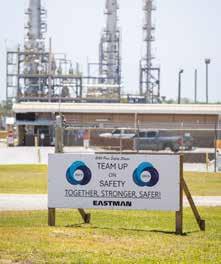
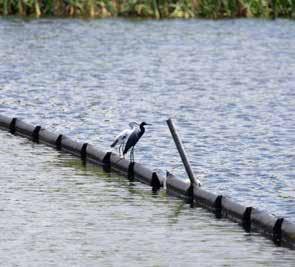

“Also, we’re surrounded by a wildlife sanctuary, so we take the environment very seriously, as well. We have birds out here that you can’t find anywhere else in Florida. We try to be good stewards of what we have.”
Innovation, meanwhile, is in the company’s DNA. Perhaps its most exciting current project involves confronting the plastic waste crisis.
In Kingsport, Eastman is utilizing a process to break down non-recyclable plastics at the molecular level, from polymer to monomer, so that they can be built back into new polymers that are indistinguishable from virgin materials. The process is “circular,” meaning that it can be repeated over and over again while using less energy than it would take to manufacture a new product.
“Our purpose is to enhance quality of life with the materials we produce and through our people, who are the difference makers,” said Eastman corporate communications representative Amanda Allman. “We make products that people interact with every day — in your home, in your car, at the doctor’s office, you name it — whether it’s made in Pace or one of our other facilities. We are a company that stands by what we say, and we really believe in our purpose and the materials that we make.” ▪
198,268
SOURCE:

Crystal Washington has earned a reputation as a technology trends expert. In March, she presented a primer on artificial intelligence and its ramifications at BEYOND, Florida Power & Light’s Northwest Florida Economic Symposium, held at the Sandestin Golf and Beach Resort.
While the event has a regional orientation, many of the issues discussed were inevitably global in nature. Indeed, conference regular Dr. Jerry Parrish, the chief economist for the Metro Atlanta Chamber and a Florida State University faculty member, was called upon to address “The World Beyond Northwest Florida.”
In so doing, he talked about the emergence of Mexico as America’s No. 1 trade partner. He described the disruption to supply chains caused by pirates raising havoc in the Red Sea.
Eighteen years ago, the multiple Pulitzer Prize-winning Thomas Friedman wrote about an astounding realization he made while visiting India.
“Columbus accidentally ran into America but thought he had discovered part of India,” Friedman wrote in The World Is Flat. “I actually found India and thought many of the people I met there were Americans. Some had actually taken American names, and others were doing great imitations of American accents at call centers and American business techniques at software labs.”
Friedman met with the CEO of an Indian information technology business who observed that the worldwide dissemination of computers and the advent of email and search engines had made possible the delivery of intellectual work from anywhere.
“The playing field is being leveled,” the CEO said. It then occurred to Freidman that while Columbus proclaimed that the world is round, he was discovering that it is flat. That inescapable, inconvenient truth won’t go away, despite an intensifying current of isolationism in the U.S. and elsewhere.
It is no longer possible to conduct a regional conference that is strictly regional in scope.
Washington displayed two pictures of berries on the large screens at the front of the conference center ballroom, divided conference attendees into groups and directed them to reach a consensus about which berry they would eat if they were really hungry.
In one picture, there were edible wild grapes, in the other, fatally toxic moonseed berries. The vast majority of participants in the exercise chose the latter, perhaps because they appeared larger in the photos.
“You’re dead,” Washington said to the moonseed crowd.
She had sought to make the point that decision-making can only be as good as the information possessed by decisionmakers, be they humans or AI programs. If the moonseed folks had known that wild grape plants have toothed leaves while moonseed plant leaves are pointed only at the tip, they might have lived.
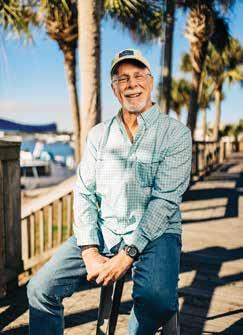
The world has been flooded with information. The news media landscape is fractured like never before. People make choices. People take shortcuts. They spend time with the networks, writers and podcasters who supply them with content that is consistent with what they know, think they know or want to believe. Politics works the same way.
All of that is understandable. In a world where sea changes come like waves — computers, internet, social media, COVID-19, AI — we may flail about, looking for a life raft and pining for simpler times. Ah, but we’ve been tempted by poisonous fruit before. Those who seek refuge in the past may as well have moonseed berries on their Wheaties.
As Bob Dylan sings about a-changing times, “Better start swimming, or you’ll sink like a stone.”
Stay current,

STEVE BORNHOFT, EDITOR, 850 MAGAZINE sbornhoft@rowlandpublishing.com



